#if he really can be worthy of being a hero)
Explore tagged Tumblr posts
Text


I always think its a pity that after Marvel brought him back (Because of course they did) they never really followed up on what was probably the most three dimensional writing Doctor Octopus ever got in this story
The idea that deep down Otto actually enjoys his battles with Spider-Man and to a certain extent his "Doctor Octopus" persona is a mask he puts on because he enjoys being the villain and matching wits with a genuine hero is actually a really interesting one
It's a fun twist on the character that makes him a bit less two dimensional while still keeping him very much a bad guy
Like even here where he's doing something good and trying to help Peter, he's not trying to reform or seek redemption...he's doing it because he misses the old Spider-Man and wants him back to his old self so he can go back to hatching evil plans and having Spider-Man show up to try and thwart them....it's basically a full on "The Man Who Killed Batman" moment, Otto has no interest in being a super criminal if he hasn't got a worthy arch nemesis to fight
Also for those curious what Ock is talking about here, at the time this story came out the writers had really REALLY made some baffling choices for Spidey's character...he was brooding all the damn time, calling himself "The Spider" and inner monologuing about not wanting to be human anymore and it was all so damn grim and a slog to read honestly, he was making Miller! Batman seem cheerful and upbeat
This story arc (And the Clone Saga as a whole really) was basically meant to do away with the grim and grittyness and give Peter a much deserved retirement while introducing Ben as a new Spider-Man who hadn't been through all the trauma Peter had that had left him in such a state
But y'know...if wishes were horses, beggars would ride and so on...
104 notes
·
View notes
Text


Chasm: Curse of Kaine (Vol. 1/2024), #1.
Writer: Steve Foxe; Penciler and Inker: Andrea Broccardo; Colorist: Brian Reber; Letterer: Joe Caramagna
#Marvel#Marvel comics#Marvel 616#Chasm: Curse of Kaine#latest release#Scarlet Spider#Kaine#Kaine Parker#Chasm#Ben Reilly#giant long-haired perpetually dying Kaine with the tattered magenta cape no one’s doing it like you#(Ben’s Spider-Man costume also remains in my top favorite Spidey costumes but that’s beside the point)#what that last panel box has me wondering is: at what point does Kaine’s comment become meta?#because on a narrative level it’s speaking to Kaine’s wrestling with this idea of guilt over his past#(for hounding Ben for so long primarily as well as how Kaine of all people ended up as the Scarlet Spider#if he really can be worthy of being a hero)#but that observation of «wow Ben sure can’t catch a break» is something I’ve been thinking for years#as editorial seems to categorically refuse to let Ben be happy or even heroic for that matter#I remember a comment floating around about how editorial didn’t think there was a place for Ben in the modern comics landscape#what with all the spider characters there are now#I push against that idea on principal but sure even if that was true they could just as easily have Ben retire with Janine in obscurity#as opposed to blowing up his brainpan and have him stoop to mugging tourists#anyway that’s a lot about Ben on a Kaine blog#but I guess this entire event highlights how incredibly intwined their stories are even after all this time
12 notes
·
View notes
Text
Back to looking through 光渊 on weibo. I'm gonna be insufferable when it airs again <3
#rant#thinking nonstop about how intense it is that fei du has a daddy kink#in fact ALL of fei du/luo wenzhous dynamic AND how it changes is so fascinating#i wrote pages and pages on it (now also on my ao3 as liveblogs)#like... how fei du and luo wenzhou both rely on the other to feel like a villain/hero a normal child/a protector who didnt fail#and also how they HAVE to eventually treat each other as equals instead of on pedestals before they actually can get togethet#but those former roles still inform the kinks they have once they do treat each other equally#like fei du Loving that luo wenzhou scolds and babies him#because luo wenzhou treats him as worthy of love and worthy of kindness. and also would never truly trap him#and so luo wenzhou is a safe place for fei du to indulge in that childishness and be treated like a kid safely#while also knowing lwz sees him as an equal and would stop if fei du asked (once theyre together anyway)#meanwhile luo wenzhou feels validated when fei du obeys him. feels like its proof his judgement is good. that he makes good decisions and i#a good protector (something lwz struggles through his life with is thinking he should be a perfect hero#then failing to protect childten like fei du from abuse. failing to recognize when people will betray him. fear he will fail to save more#ppl and put more ppl in danger).#and so fei du letting luo wenzhou Indulge in caretaking and giving orders. lets luo wenzhou feel like he CAN successfully help#and like his judgements at least at home with fei su ARE good. because fei du is complying#and fei du would only comply if he felt luo wenzhous judgement was sound#so like. domestically their life is kinky as fuck but. not just sex. like they really feel relief at this#daddy dom/bratty sub in general#fei du relieved he can be a brat safely with someone. be scolded and yet be fine. luo wenzhou relieved he can#successfully protect fei du/is being judged as helpful#their whole private domestic life is drenched in the daddy dom/bratty sub thing they got going on#modu#justice in the dark#silent reading
2 notes
·
View notes
Text
I didn't really have a song in mind for Link to be playing in my ghiralink Orpheus and Eurydice fic—mostly just unnamed song in an unfamiliar language because that was easy lol—but I'm listening to Zelda music and I think it would be fun if it was Laruto's Lament :) it's a simple harp melody, and the lyrics are in Latin, which would call back to the Greco-Roman origin of the myth:
Ad idem, Ad infinitum
In memoriam, cor unum
vi et armis, vale
As is the same eternally
in memory, one heart
with strength and arms (weapons), farewell
The Latin isn't... great. Also I did the translation while listening to the song so I may be
If you look it up online the most popular translation is
Ad Idem (Of the same mind) *idk where they got mind from, and ad mean to/towards not of
Ad Infinitum (Without Limit)
In Memoriam (In memory)
Cor Unum (One heart)
Vi et Armis (By force and arms) *vi et armis is ablative, so it could be with or by, usually determined by context that doesn't exist here. This translation went for a darker interpretation
Vale (Farewell)
We share one mind
Time cannot bind us
Remember
The heart we share
Now the enemy arms destroy me
Farewell
Which isn't exactly what it's saying but works well enough!
#it fits the sequel I haven't written where Link and Ghirahim become permanent inhabitants of the temple#the sequel if from botw Zelda's pov visiting the spring of power and sws Link shows up as a spirit to guide her#because he was also 'late' in becoming the hero and seen as weaker than his previous counterpart(s)#but he succeeded#and he's kind of like. do you really want hylia to answer you? this action will have consequences#Ghirahim's there but sulking in his sword form for some reason. Link mentions him and warns Zelda that botw Link should avoid him#and it would get into what I set up from the previous fic about how Ghirahim can only be drawn by someone who is worthy and would except#the dark power without changing it#mostly it would be a link&zelda thing#I'm just thinking about sws Link who in an Orpheus/Eurydice situation took Ghirahim's curse on himself as well#and is now stuck with him forever but in like an underworld spirit-y kind of way#the spring of power being revered by Hylians as the place where Hylia trapped Demise's sword#because power is usually associated with ganondorf and therefore the hylians see it as bad#and sws Link there to tell all who come after him asking the gods for help to hurry up fate or change it or something#that it doesn't work#also I like the song#ghiralink
11 notes
·
View notes
Text
Honestly my headcanoning for The Cursing of Chateau Castle lore continues cooking in my brain like I got more for it but it's all in the microwave for now. Like I got a whole ass storyline for Pierre and Lady Irene. With how hardcore hc-ing I am bout these characters, it makes it seem like they're my OCs but no they're like-- my half-children I think? isat is the other parent of course. I got nothing else to go off of in regards to the chateau trio but the small crumbs and a dream.
#aria rants#like bout pierre's home life being The Worst ever. and like the internal monologue he'd have after sacrificing their castle#imagine going through all that ordeal. joining the supposed ''heroes' party'' and then betraying The Hero aka josephandre#all for your own family to recognize you as being worthy of being a part of the family. so that you can be recognized as a noble#but in the end it wasnt enough. he wasnt happy. in the end pierre was happiest with josephandre and the others so he#went around. turned their back on the ppl he has spent majority of their life proving their own worth to go back and save#the first genuine friend he ever had in ages and the cost of that being the very castle they wanted to be a part of#so in the end. he never got to actually be called ''lord'' he didnt have a place in the family. he lost the castle#but thats fine anyway cuz he found a home with josephandre and the others BUT THEN!!! he apparently got into a near-death#experience like how horrible is that??? to have your title stripped away from you from birth and then abandon the#one chance and opportunity to have that title for the sake of saving your friend and realizing that it'd be better to just be#with them instead but before that moment can even sink in well enough-- YOU'RE NOW ON THE EDGE OF DEATH!#yea pierre is turning out to be my fave character from like-- that mentions of them betraying the party and then#sacrificing their own castle to save josephandre and then the fate of them possibly dying near the end of the series#like that guy went THROUGH IT. not as much as josephandre but he really did just went through it and im like-- out here#using my brain power to the maximum in filling in the blanks cuz i got attached to 3 characters with only a name and#some information. i got some more in regards to lady irene and josephandre too btw like-- this is for you mirabelle#im spreading the cursing of chateau castle propaganda as best as i can with the crumbs im given
3 notes
·
View notes
Note
Monster!König whose first course of action after the monster uprising was to find his missing bunny wife!Reader who has no idea he even considered them married in the first place. König who is clueless when it comes to societal norms or concepts and learns about marriage through picking up conversations from scientists back when he was locked up. (Still doesn’t have the greatest grasp on it even after getting his hands on human books and media) Reader is just happy to be free from being used as a breeding machine and had no idea her cell?mate thought their relationship ran that deep and wants to get legally married now. :/
Some of the scientists laughed, calling you Konig's little bunny wife. A packmate, someone to get his stress dumped in so their captive monster could be less of a killing machine and more of someone who can actually be controlled and sated. Throw him a bitch with a leaky hole and whiny voice, and he'd be satisfied until the end of time. Konig doesn't like the sound of laughter that comes from the scientists, but he likes the word "wife" forced on you. Wife. Pretty, cute, adorable, small, and fragile thing that needs him to survive - it's basic biology. Needy bunnies like you can't survive in a world filled with humans and certainly can't do it in the new reality, where the strongest are getting all the cards. When Konig eventually gets out, he reads - to his surprise, really, and to the surprise of all of his comrades who would much rather burn everything the old rulers of their world have left. But Konig reads - romance novels, human courting rituals, the true meaning of the word wife and the word husband. He thinks of ways he can put together a wedding worthy of his precious little bunny - when he would finally get her with him, of course. He finds you, of course - it's not that hard to find a bunny in this shrunken world when he has almost all of the power he could have. A colonel in the monster forces, somewhat of a hero waiting for his mate to arrive - you're given to him as a gift from his comrades, a pack of soldiers eager to please their commander. Yes, the little bunny was crying and squirming in his grasp when she was delivered, but it's hardly his fault, is it? Konig just isn't quite sure on how to go about this whole marriage thing and what to do when your pretty wifey is desperately trying to get out of his grasp. He squeezes your throat a bit until you stop trashing in his hold and then spends the rest of the evening exploring your precious needy holes with his tentacles and his hands. God, he missed the feeling of your pussy clenching on his cock, desperate for him to release his seed. You're a bad little thing for denying him, but it's okay, he can work with that. He doesn't care if you're dumb or ungrateful - he will just press further, push his cock as deep into you as possible, squeezing your soft breasts until he swears the milk will come. He will have to breed you for this, of course - as thoroughly as possible until you can't help but cry and moan in his hold. Scientists never allowed him to actually dump his eggs in you, always afraid that he would get too possessive and territorial protecting his clutch and the pregnant mate - but oh, no one is there to stop him now. You would forget all about resisting in a bit - it would be much easier to push you around once you're getting the role of his pretty little wife, just like you were intended to.
#cod#konig x reader#konig#yandere konig#cod x reader#yandere cod#monster!konig#tw: monster fucking#bunny!reader
2K notes
·
View notes
Text
Lazy thing i wanted to do!!! they're just silly :3







I think dave is a pretty princess and John is awkward
I'll be yapping below
I believe that Dave texts John right after he gets his ass handed to him DAILY. It usually plays out like this where they banter and Dave never really goes through the extent of explaining what thoroughly happens to him so John lives in forever ignorant bliss. And this leads Dave to feel like there's more of disconnect because he first of all doesn't really know how to articulate his feelings and second abuse doesn't seem like abuse to the victim. So he goes about everyday unknowingly yearning to be saved by someone greater than him, which is why I put the snow white reference at the end hehe.
Snow white as a fairy tale is extremely cliche, you got the prince in shining armor showing up conveniently on a horse and saving the girl. There's always this hierarchy placed upon the story where the damsel in distress is saved by a man, that man being portrayed as a greater being.
And with John taking place as the prince in this context paints him as this greater being. And I feel like a part of Dave envies and despises John for being this way, for being "perfect" or in a way. Greater than him.
The thing is in the original snow white story she's unconscious, that's undesirable. But it adds to the desperation of wanting to be saved, shining a better looking light on a person who isn't really there for reasons you want them to be. However John is a sincere person, it's more so the lack of communication or true understanding of one another that leads to this rift, this belief that John isn't there for Dave because he loves him, but because he's his friend and it's John's duty as a friend to save him. Which also brings me to the last line where Dave never corrects himself, and how he insinuates that he'll be unconscious due to being placed in a glass coffin much like snow white was when she was poisoned. He's at this stage where he doesn't want to be saved by an outer source, a greater person than him. He wants to be saved by himself he wants to prove worthy, but then conflicting within his mind is also this idea he isn't good enough to. We all know that Dave believes he isn't a hero and explicitly states John is the hero multiple times throughout homestuck. So he stays waiting.
John however, refers to Dave as Cinderella, Cinderella gets abused and put through plenty of torture from her step sisters and is saved through marriage of some person she just met. There's still this base line of being saved by man however there's this more mutual understanding of what they're getting into, a similar yearn for one another. Though he never caught her name he was still willing to find her, the real her. Which is John in this case, he probably understands he's missing something in the big picture but can never find out what and the best he can do is hope that the other half still held on to what they once were and was willing to share.
This is a pre-sburb interaction btw they're just unknowingly foreshadowing a shit ton.
Sorry if there's like bad shitty writing in here, I'm rambling and it's like almost midnight hehe
2K notes
·
View notes
Text
Primarch political marriage AU where the Emperor attempts to make the primarchs care more about humanity by forcing them to get married. Thankfully, they're allowed to pick their own consort and because Big E can't do anything without being extremely extra (and because it's an excellent way to generate a hell of a lot of good press), there's going to be an elaborate series of parties to display the best that the imperium can offer in the way of potential mates.
Feat.
- the entire Death Guard becoming the Mortarion Primping Squad (led by Typhon) in the hope that getting laid might cheer Mortarion up
-Fulgrim fully understanding the assignment and DOMINATING the entire first night. He really doesn't want to have to pick another wife, though.
-Dorn becoming absolutely fascinated with shapewear- he hadn't ever thought that clothing could be engineered like that before.
-Ferrus Manus trying to hide against the wall, since he has no idea how to talk to women
-Konrad Curze is strangely popular, and gets more popular after he starts predicting the deaths of anyone who dares approach him- the girlies love some fortune telling
-Bobby G calling his mom to ask for advice on how to woo women
-Magnus becoming dejected that women don't flock around him like Fulgrim and Sanguinius. He hasn't put it together that it's because he keeps being a giant nerd about magic and no one has any idea what he's talking about.
-Perturabo is determined to be married before Dorn, so he's brought in Caliphonie to help him pick what to wear. He proceeds to ignore her advice about how to actually win over women.
-Lion getting dancing lessons from Luthor
-the imperial press being flooded with augmented pictures and bios of the primarchs, all to make them seem like romantic heroes. The imperial press in general is just out of control the entire time...
-Malcador really wishing he told the Emperor that this is His worst idea yet
-the Alpha legion getting in a lot of cross-dressing practice.
-Leman Russ refusing to marry any woman who cannot wrestle him to the floor. He doesn't care that they're all baseline humans, any woman worthy of bearing his children should be strong!
-the Mournival taking bets on who's going to get married second (because obviously Horus is going to be the first)
-Sanguinius getting overwhelmed by the amount of attention he is receiving and cocoons himself in his wings at some point in the night. He refuses to come out, even for snacks.
-Lorgar doing well until he tries the whole 'God is telling me that you're my wife' line.
-Horus using the worst pickup lines imaginable and getting away with it.
-Vulkan being delighted by the chance to do something that's not war related for once. He has an absolute blast dancing, although he might be a little too enthusiastic.
- Corvus trying to escape and having to be dragged back into the party by the custodes (under the Emperor's explicit command)
-Jaghati showing up with a whole-ass herd of horses to prove his fitness as a mate
-Magnus is the sluttiest-dressed in the entire room, scandilizing Lion and Lorgar. He even pierced his nipples for the occasion.
#warhamer 40000#wh40k#primarch#horus heresy#absolutely bonkers AU#magnus the red#horus lupercal#ferrus manus#fulgrim#mortarion#konrad curze#lion el'jonson#robute guilliman#perturabo#rogal dorn#lorgar aurelian#corvus corax#vulkan#sanguinius
670 notes
·
View notes
Text
One trope I really dislike in love stories (mostly common to fanfic and romance novels but it can be found elsewhere) is when the author goes out of their way to (a) establish that a protagonist had absolutely no significant positive feelings for their previous sexual/romantic partners and (b) presents this chiefly as proof that the other protagonist is uniquely Worthy and that the main romance is True Love. This is a pretty specific scenario; I’m not talking about, say, the hero who has no romantic or sexual experience, or the heroine who married young and her husband was shitty in a specific way, or the protagonist who enjoyed their past relationships but they never totally clicked. I’m talking about “the hero has slept with so, so many women, but don’t worry! He never felt so much as slight fondness for them or admired any of their non-physical qualities. He might as well have been using a blow-up doll every time.” Or “the heroine has only ever loved the hero. She has never looked upon another man with lust in her heart. If she ever dated anyone else, she never felt affection or respect or admiration for him. This is proof of true love, not the result of dating only shitty guys or maybe being kind of a tool.” I promise, it’s not going to ruin a romance if the hero is like “my ex-girlfriend was a good person” or the heroine is like “I enjoyed having sex with the guy I dated for five years.”
3K notes
·
View notes
Text


♡︎ Izuku Midoriya as your boyfriend ♡︎
Pairing: fem!reader x Izuku Midoriya
Genre: fluff
Warnings: suggestive content, jealous!Izuku, sub!Izuku
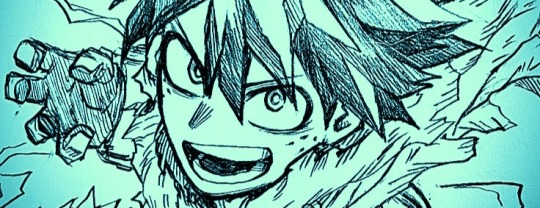


•° first of all: he's the number 1 babygirl.
•° every hour of the day, no matter what you're doing, he'll take pictures of you. His gallery is just full of your photos. every week his lock screen changes to a new photo of you. And then he loves looking at your beautiful smiling face at night in his bed before falling asleep, so he can dream of you. When you ask him if it's necessary to take all these photos, he answers that they're useful during the times when you can't be together because of missions.
•° do you really think that the photos are enough for him? Nah, Izuku clearly has a talent for drawing, and he certainly won't waste it by only disdaining sketches of other heroes. No, in his room he has a drawer dedicated only to you, inside which there are a lot of notebooks portraying you.
•° you don't have to talk, for him even just looking at you while you share headphones and listen to your favorite songs, with a breathtaking sunset in front of you. That's enough for him.
•° he lets you do any hairstyle on his messy hair. He loves the warmth of your hands in his hair and most of all he loves your laugh when you pass him the mirror to show him the many pigtails you've made on his head.
•° speaking of laughter. HE LOVES YOURS. He would die to hear it one last time. Let's be real, he's not the funniest person in the world, but he puts his all into putting a smile on your face, accompanied by the melody of your laughter.
•° he obviously has a praise kink, tell him how good he was at something: school, missions, even the silliest one and you'll immediately notice the blush on his cheeks.
"Izuku, baby, you did so good today on patrolling. I'm so proud of you." you praise him while placing your hand on his cheek.
"t-thanks, baby. You d-did good too." He's literally pout in your hands.
•° PDA is scared of Izuku. he loves showing you affection both when it's just the two of you, and outside, no matter where you are. Kisses, hugs, arm around your waist, your head resting on his shoulder. He doesn't care if anyone is watching you.
•° it might not seem like it on the surface, but ohh HE'S A JEALOUS JEALOUS JEALOUS BOY. Despite his puppy-dog appearance, he wastes no time when someone stares at you for a few seconds too long to put an arm around your shoulders and turn you towards him, so that he is your only view. Not to mention when they hit on you.
"so, you free tonight, pretty?" a boy a little older than you leans against the bar counter where you're sitting at.
"sorry, but I'm not interested. I have a boyfriend." You try to dodge him off.
"oh, c'mon." He reaches for your face "I don't see him around". Before he can lay even a finger on you, a hand slaps the boy's hand away, and based on the look on his face it must have hurt.
"you didn't see me, but bet you felt that." He couldn't leave you alone even to go to the bathroom, ugh.
•° his only reasons for living are two: to become a hero worthy of being called such and...you. He worhips you so much, you're a goddess in his eyes who can do no wrong. You're just out of this world for him, not real.
•° SUBMISSIVE!! Oh this boy is the definition of submission. In bed he becomes a real mess for you, the control is yours and you can do whatever you want with him, he won't say a word, don't worry.
•° he's the kind of guy who gives you little gifts almost every time you go on a date, or rather every time you see each other. It could be a bouquet of flowers, an origami heart, etc...


#izuku midoriya#izuku midoriya x reader#deku#deku x reader#mha izuku#mha x reader#izuku midoriya x you#izuku x reader#deku x you
405 notes
·
View notes
Text
JASON TODD VS. DABI: WHY NOT ME?
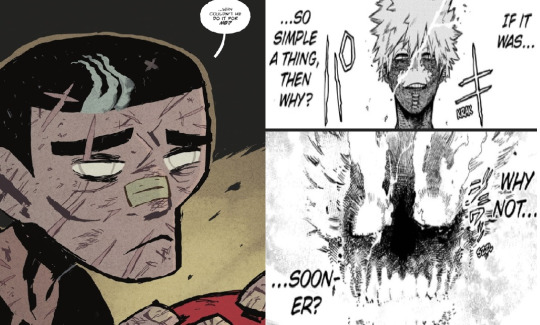
"You haven't been here long but you've seen him, right? The batman. The batman. He lives in darkness, to find the helpless and bring them into the light. So I have to wonder...why couldn't he do it for me?" The Boy Wonder: Issue #2
This is the story of the boy who didn't get saved. The story of a boy who really ought to have been saved. Of course, every victim deserves to be saved, but this boy was the son of a superhero. Can a hero who saves everyone, but fails to save his own son really be called a hero? As for the son, how does it feel to watch his father save complete strangers but let him fall to the wayside?
Jason Todd and Dabi are two characters with similar backstories and motives (so similar it's possible Dabi is outright based on Jason Todd) which are worthy of comparison. These are two tragic arcs which explore the conflict between a hero's responsibility to act as a father, and their responsibility to save people. As I said they are tragic because in both cases the hero fails, as a father, and a hero. However, I'm comparing the two because Jason Todd's story is a well written tragedy, and Toya's story is not.
If you were to write a story of my life, it would surely be a tragedy.
Aristotle's Poetics is the first attempt to define what Tragedy is, not as a story where sad things happen but a specific story structure. He outlines not only what makes tragedy, tragedy, but also what makes a good tragedy.
The Plot, then, is the first principle, and, as it were, the soul of a tragedy: Character holds the second place. A similar fact is seen in painting. The most beautiful colours, laid on confusedly, will not give as much pleasure as the chalk outline of a portrait. Thus Tragedy is the imitation of an action, and of the agents mainly with a view to the action.
I use this quote because the painting metaphor is a great way of explaining what I'm getting at, you can have a painting with the most wonderful colors, you can have a story with really good ideas like the Todoroki family plotline but if you don't use those colors correctly all you're going to end up with is a bad painting.
In poetics Aristotle clearly defines a tight well-structured plot as the first priority for effective tragedy, character as second.
Again, a beautiful object, whether it be a living organism or any whole composed of parts, must not only have an orderly arrangement of parts, but must also be of a certain magnitude; for beauty depends on magnitude and order. Hence a very small animal organism cannot be beautiful; for the view of it is confused, the object being seen in an almost imperceptible moment of time. Nor, again, can one of vast size be beautiful; for as the eye cannot take it all in at once, the unity and sense of the whole is lost for the spectator; as for instance if there were one a thousand miles long
To make sure you understand, it's vital in tragedy for all the pieces to fit together. Tragedy is a specific story format. Good tragedy uses the parts of a story well, but bad tragedy is sloppy and poorly put together. In tragedy, the whole has to be greater than the sum of its parts. The Todoroki Family are all good characters out of context, but the story could have enhanced their characters but detracted from them due to how poorly it is told. The fact that a lot of MHA fans are in love with the Todoroki family out of the context of the story, but also have constant complaints for how Horikoshi handles their plotlines is, in my opinion, very telling.
What Aristotle goes on to posit is the best tragedies do not come about by accident, but rather by the direct actions of the characters.
But again, Tragedy is an imitation not only of a complete action, but of events inspiring fear or pity. Such an effect is best produced when the events come on us by surprise; and the effect is heightened when, at the same time, they follow as cause and effect. The tragic wonder will thee be greater than if they happened of themselves or by accident; for even coincidences are most striking when they have an air of design.
Therefore Tragedies require consequentialism, like Newton's Third Law, every action will have an equal and opposite reaction. To simplify a good tragedy arises from the consequences of the character's actions (or inaction). The most basic form is that the hero of the story will have a tragic flaw that they fail to improve upon in time and then leads to their destruction. In essence, tragedy is where the hero fails. Not only does the hero fail, but the hero loses, and that irreversible loss is what defines tragedy. Medea slays her own children, Oedipus rips his own eyes off and deserts his kingdom, Creon Antigone is buried alive and Creon's son, her fiancee, commits suicide.
These events share two things in common, they are irreversible (hence why they feel like good endings), and two they evoke catharsis. Aristotle defines the goal of tragedy to evoke terror and pity. We feel alongside these heroes, Medea was abandoned by the husband Jason who she left her home and slaughtered her own brother for, Oedipus did all of his crimes unwittingly and is a victim of fate, Antigone was doing the right thing by burying her brother so his soul could pass on to the afterlife.
There's all different sorts of tragedies, Hamliet explores more here. I'd say UTRH and Hellish Todoroki Family are tragedies centered around grief.
Tragedy works on extreme emotions, and extreme hard-hitting consequences to the hero's failures. The worst thing a tragedy can be is boring.
The Tragic Hero
Now that I'm done lecturing you let's actually talk about both My Hero Academia and Batman like I promised. Both of these stories don't actually feature the central victim as their protagonist, and that is a feature not a flaw.
Rather, the story we are being told is that of a tragic hero, failing to save a tragic victim because of their own personal flaws.
These flaws are called (hamartia) or "error in judgement". A hero, being called a hero of a story is often unaware of his flaws which is central to what makes them unable to fix those flaws in time. That flaw can later lead to a moral failing, such as Othello's jealousy, initially jealousy is an understandable emotion, but then it leads to him trusting Iago over his own wife and killing his wife in a rage.
Most importantly, the hero’s suffering and its far-reaching reverberations are far out of proportion to his flaw.
Let's begin with talking of the heroes and their flaws, Batman and Endeavor. My main reason for comparing these two is in these specific stories they have the same flaw, inability to move past their personal guilt towards their son, and the same conflict the duty of a father versus the duty of a hero.
However, Batman functions as a tragic hero, and Enji does not. The summary of their conflict is right here in these two panels.
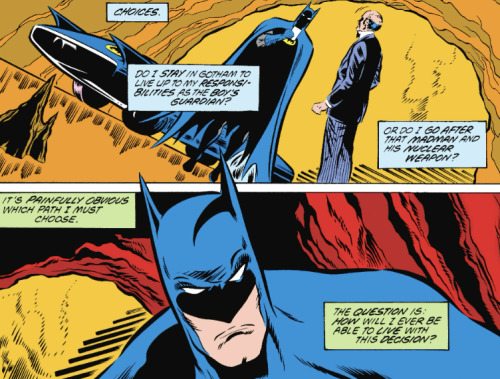
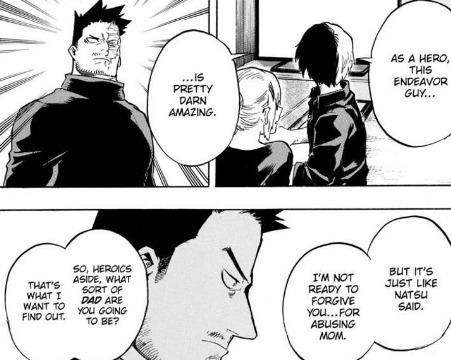
A parent is required to place their children above everything else, because they are the ones responsible for bringing that child into the world. Bruce Wayne made the decision to adopt Jason. Enji made the decision to have children, however with Enji you have the added insidious motivation of he only wanted to make designer babies and just didn't care for the ones who didn't turn out right.
Bruce attempts to do both, to act as a father for Jason and also a crime fighter as batman but he can't do both. This comes to a head in Death of the Family when Jason is having serious trouble because of his lack of a strong parental figure, and Bruce knowing that Jason is in trouble chooses still to go off and fight crime instead of staying with him. The choice to place crimefighting over the child they chose to take responsibility for has the unintended consequence of getting that child killed.
Whereas Enji makes the same choice over and over again, ignoring Toya's clear troubles at the fact his father no longer spends time with him and choosing to run away to the world of heroes because he doesn't want to face the fact that his actions are severely hurting his son. Bruce's motivations are more sympathetic admittedly he wasn't actively practicing eugenics, but the choice is the same and the consequences are the same.
Both Bruce and Enji are forced to bear witness to the deaths of their children when they are not there, specifically because they made a choice to be a hero instead of staying by their child's side. A situation directly caused by their choice to be a hero over a father, and a situation that would have been avoided if they had stayed with their child in their time of need. Jason runs off when Batman tells him to stay and gets kidnapped by the Joker, if Enji had been on Sekoto peak that day Toya would never have accidentally lost control of his fire.
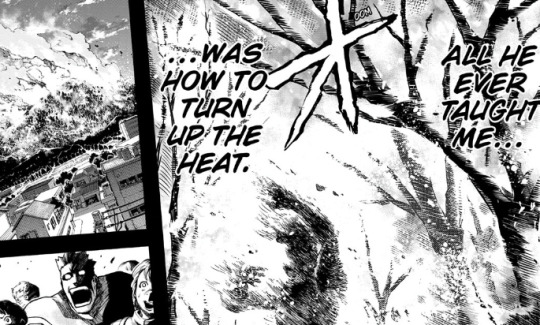
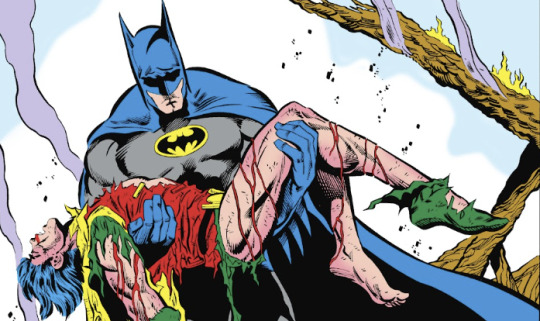
This is just the backstory however, the main event that kickstart this plot is the unexpected return from the dead of both Jason and Dabi. Each story follows the same plot beats. A new villain appears to challenge Endeavor / Batman. The villain reveals themselves as their dead son. Both Endeavor / Batman are given a chance to try reaching out to their sons, but they choose not to.
Then even though they are given a second chance with a miracle of a dead son coming back to them, they choose the exact same thing they chose before, being a hero and because of that the tragedy repeats itself. For both of them they are unable to save their son again, and the son goes through a second death. History repeats itself, the lesson isn't learned.
Their fatal flaw is their guilt. This is a story about grief and mourning after all, a son who is died, buried, but never grieved properly, never mourned, an open wound on the father suddenly coming back. The inability of each to process their grief blinds them from seeing the fact the son has come back, and they have a second chance.
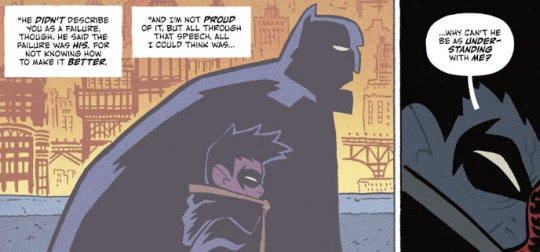
Toya has internalized he is a failure, because Enji literally called him that. Jason believes that Batman thinks he is a failure. In both cases the father is the one who failed, Bruce at least acknowledges this but cannot communicate it in any way shape or form.
This guilt and responsibility both Enji and Bruce feel causes them to self-sabotage. They no longer have the confidence they are in the right (they no longer feel like heroes because they have failed to be heroes to their own son).
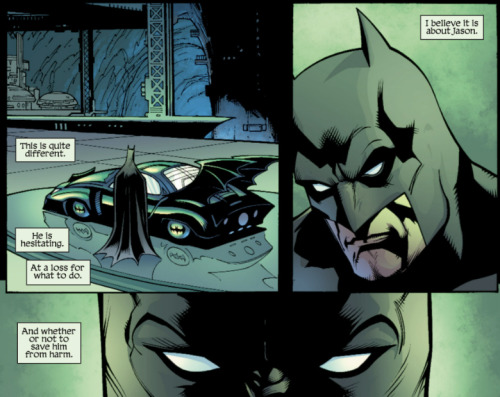
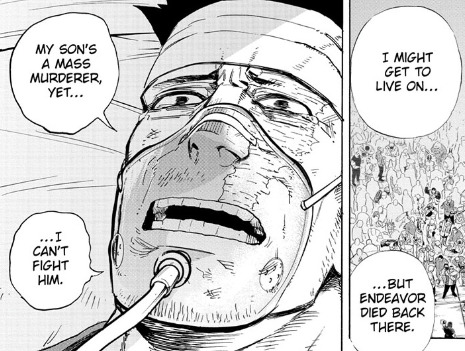
You can also add the layer of complication that since both men chose to be heroes in the past, they do not know how to handle the situation as a father now that they're being challenged to step up as one. Unfortunately, they are not the fathers that stepped up.
The reason their grief becomes a flaw is because they put their grief over their victims. . Each man is aware too much of their own failure, and while they should feel guilty they make the classic mistake of placing their own guilt over the feelings of the victim. The guilt they feel for causing the death and the genuine grief of losing a son is given priority over Jason and Dabi who you know... actually died.
An overwhelming grief and guilt is understandable because grief is a messy and human emotion, losing a child is an unimaginable tragedy that should never be inflicted on anyone.
Yet at the same time both Dabi and Jason are grieving to. This paradox that Batman only thinks of his own grief at losing a son and never stops to think about how Jason must feel leads to one of the best lines in Under the Red Hood.
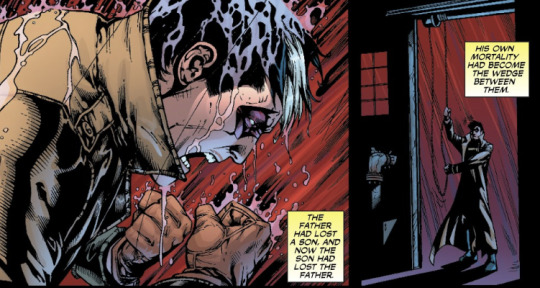
"The father had lost a son, and now the son had lost a father."
Batman's guilt is so strong over being the cause of Jason's suffering, that the suffering of the victim himself is ignored. To be fair to My Hero Academia, the Todorokis say a similar line to Enji.
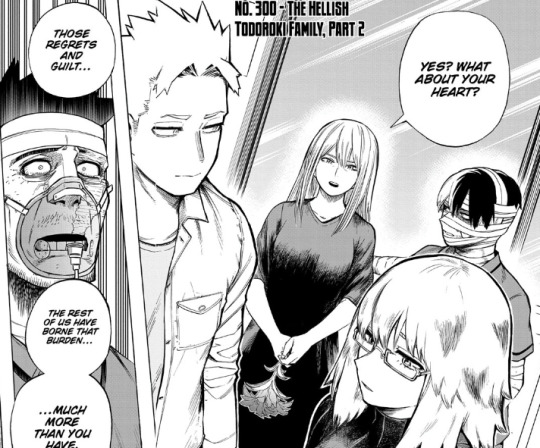
However, this is where I begin to get into the difference between ideas and execution. Tragedies are stories of actions and logical consequences, every action has an equal and opposite reaction in Under the Red Hood. Batman is punished for the choices he makes, the choices he doesn't make, and the choices he fails to make in time.
The Todoroki plotline features almost none of its character making any choices of substance, and because of that the plotline says the right things over and over again, but it all comes off as tell don't show.
I'm going to quote @codenamesazanka's post right here a couple of times because they describe the complete failure of the Todoroki plotline to show us a reason why we should be feeling things for the characters artfully.
We've heard Enji say this before - I'm sorry, I intend to atone. It's indeed the right thing to say, it's exactly what he should be saying and acting. Natsuo is declaring no contact - That's fine, I'm sorry, I accept this as part of my atonement and will continue. Touya calls him a coward - That's fine, I'm sorry, I accept this as part of my atonement and will continue. The public hates him - That's fine, I'm sorry, I accept this as part of my atonement and will continue. But you can only hear this so many times before you want to snap and beat the character, the story, the writing over the head with Enji's wheelchair. Why is that? He's behaving exactly as he should, and yet...
The reason why it fails to evoke strong feelings is because of what we'd called "narrative dissonance." The actions of Bruce and Enji are the same, they both neglect to do anything, make any real attempts to reach out to their victims because they're paralyzed by guilt.
However, we are told that they have entirely different arcs. Bruce's arc is a tragic fall. He's failing as a hero. While we are being told that Enji is experiencing an arc of atonement. Enji is supposed to be improving himself, and Bruce is supposed to be experiencing negative character development but they both do the exact same thing in story. Bruce neglects Jason, we are told by the story, by the characters in the story that Bruce is failing Jason. Enji does nothing in time to actually atone for Toya or try to help him, yet, we are told again, and again, and again, and again, and again, and again that Enji is atoning with nothing substantive to show us this is the case.
To show what I meant instead of telling this scene is in chapter 252.
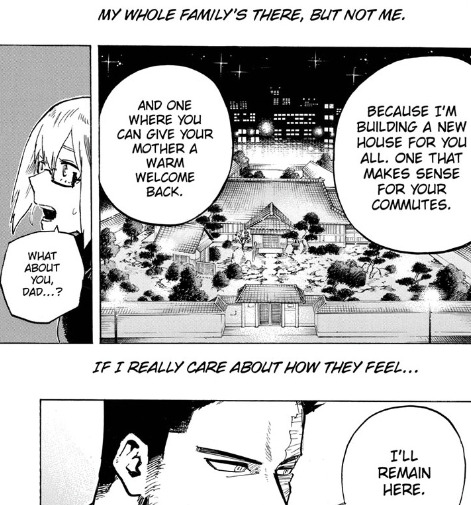
This scene is the ending point in chapter in chapter #426.
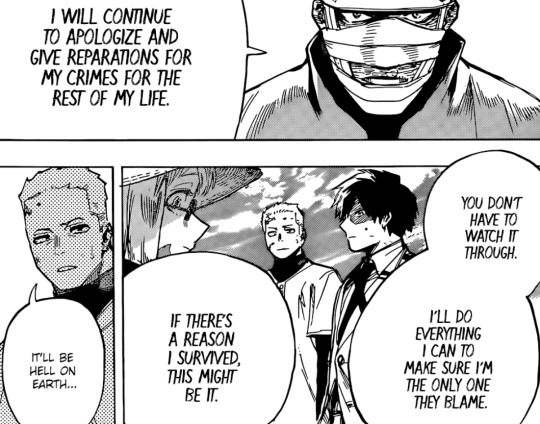
It's just him repeating the exact same sentiment and yet in a more than 150+ chapter gap, Enji never made any action to show he was now placing his family first. Enji didn't say anything to Dabi when he revealed himself as Toya. Enji didn't look for Toya in the months before the final war arc. Enji literally appeared on live TV in a broadcast that Toya was watching and said the very selfish "Watch Me" atone for the crime of creating Toya instead of literally talking about Toya or too Toya. Well, that would have rocked the boat too much... THAT IS LITERALLY THE POINT. Enji had to somehow break from tradition or make some significant sacrifice onscreen to his social standing to show that he's willing to put his family first. Enji decides to go along with Hawks decision to not face Toya head on, making the decision to be the hero for the final time which directly causes Toya to get up after Shoto brings him down non-lethally and make one last attempt to suicide bomb for his father's inaction.
Bruce does nothing for a long time in Under the Red Hood. He ignores his initial instinct that Jason came back and instead makes a long investigation on whether or not someone can come back from the dead in order to distract himself. When Jason takes the mask off, Batman already knew but was pretending otherwise because he didn't want to face the reality.
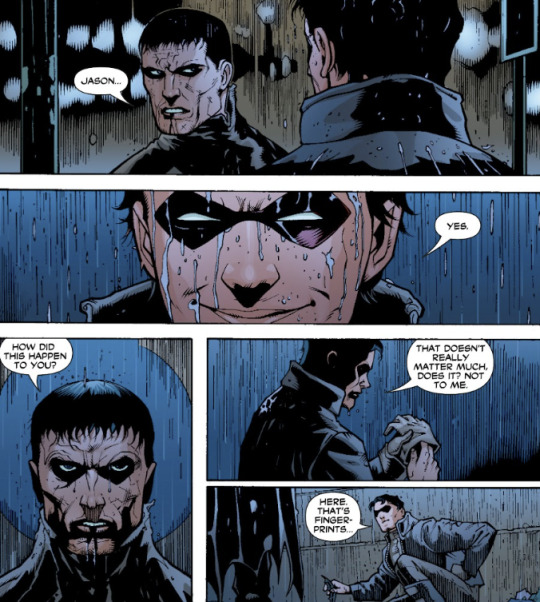
Even when Jason takes his mask off, Bruce still takes on the "I need to investigate this" angle even though Jason calls him out that deep down he already knows it's the truth. This of course foreshadows Bruce's underlying flaw, he doesn't want to face Jason head on because he feels too much grief about what happened to Jason and his guilt is more important than Jason's own grief. Just as the father has lost the son, the son has lost the father.
What follows is several chapters of Batman fighting crime as usual and making no attempts to directly search for Jason. They cross paths a few times but when they do Bruce doesn't follow. In fact, Bruce only shows up when Jason sends Bruce a sample of the joker's hair and Bruce knows that the Joker has kidnapped him out of Arkham. Bruce almost lets Jason get killed by Black Mask because he doesn't know whether to stop Jason or save him yet again, and then they have their final showdown where Jason has kidnapped the joker to demand Bruce kill him, and Bruce finally attempts to talk him down.
Out of context it sounds like I'm describing the same plotline, to the point where if you haven't read either, it looks like I'm complaining baselessly. Why is one hero doing nothing until it's too late good, and the other bad? The difference is of course context, or rather framing. Bruce's actions are called out by the people around him (Dick, Jason, Alfred) as him handling the situation wrong. Whereas both Enji's internal monologue and other characters say that he is doing his best to atone for his actions and deserves a chance, but the events we are shown in story are the exact opposite.
Here's another example to SHOW my point. Here's Dabi with my special, hardcover edition of under the Red Hood.
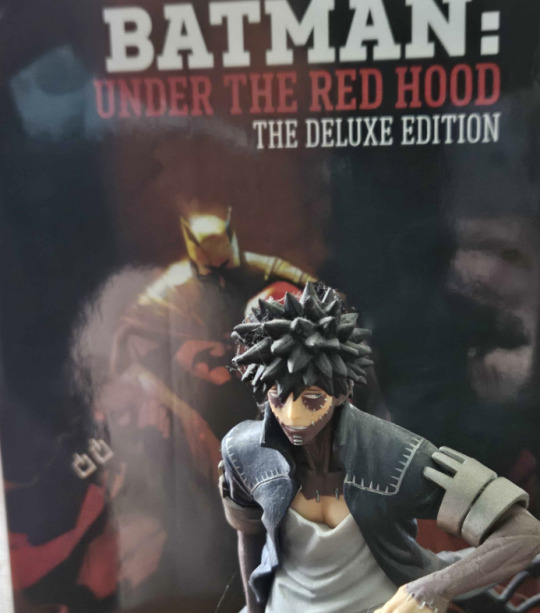
I reread the entirety of the fourteen chapter plotline and the majority of internal narrations come from characters outside of Bruce observing his behavior and commenting on how differently he's acting. Jason's backstory for instance is told by Alfred, not Bruce. Dick Grayson the first Robin comments on Batman's odd behavior. The rest are the third person narrator. Bruce has four instances of internal monologues spanning a few pages each in a 378 page story. (Alfred has the most internal monologues and he's presented as a more trustworthy unbiased narrator than Bruce, to get us to question Bruce's actions).
"Information travels on many routes, sometimes it comes predictably like the tides. You just need to know where to stand and meet it. Other times it's elusive and you have to root through the garbage to find it. In the last few years I've come to rely on Barbara Gordon, Oracle, we all did. Utilizing every form of surveillance equipment she has been the eyes and ear [...] but those days are over. I can't rely on anyone anymore. [...] and tonight it's also about the company I keep. It's different with him [night wing] out here. I think about when he was younger, when I was younger, it was different, simpler and I miss it. I miss those days, for that it's hard to be around him.
This first internal monologue is a case of unreliable narrator, because as soon as finishing it Dick Grayson / Nightwing shows up, offers Batman his help and while Bruce at first refuses it the two of them are forced to work together to fight Amazo. What does this show us? Bruce is not alone, but Bruce actively acts like he's alone ignoring the feelings of the other people around him. It exhibits a flaw of Bruce and the bad headspace he is in mentally (if I remember correctly Stephanie Brown recently died in the comics while this storyline was being published. It establishes Bruce's improper coping mechanism with grief, and how he is going about it the incorrect way.
Bruce says I work alone, and then Bruce says it's easier working with Dick, I miss it, but I can't go back to those days. It's bruce's contradictory thinking patterns in the same chapter that stop him. it's bruce's fault he cannot connect to Dick, and he is actively mourning the past because his relationship with Dick has changed.
Now the final part of the monologue in that chapter.
He's quick. Not just fast, agile. He's not thinking about his next move, he's just making it. He's been trained well. And there's something about him. Something familiar. There was something interesting about before he cut the line, before it had been taught. That had to have been practiced. Either that or just plain dumb luck. No it's not luck.
This is the first hint that Bruce already suspects it's Jason from early on but is in denial about it. This unreliable narrator trope also gives an agency to Bruce's decision, he is actively choosing to ignore the possibility that it's Jason because it doesn't want it to be.
Whereas, a lot of Endeavor's plot takes away any agency from him. For example, he doesn't even know that Dabi is Toya, because if he had the sneaking suspicion and ignored it like Batman did that might have made him look bad. We can't have the main character in a tragedy looking bad now can we?
The second monologue is more denial.
That device is from Kord industries. I should know. Ordered it special from them. How can he have it? No more dead ends. No more questions. No more guessing. Tonight I find out what is passing for the truth.
Reading between the lines this is outright confirmation Batman already knows.
The third is a brief reflection in his feelings for Jason.
The armor has to be light enough to fit but strong enough to protect. But sometimes a great many times, it's not strong enough. It wans't strong enough for Barbara who has to fight from her chair. It wasn't strong enough for Stephanie, other dear soldier enough dear grave. And it wasn't enough for Jason. Willful Jason. Who ignored the danger. Who spat at risk. Who was never frightened enough. I've always wondered... always... was he scared at the end? Was he praying I'd come save him? And in those last moments when he knew that I wouldn't. Did he hate me for it?
This monologue directly shows without stating it outright, Bruce is prioritizing his feelings of grief and failure mixing them in with his genuine grief over the loss of a son. it's selfish of him, but grief is a selfish emotion.
Here's the thing Bruce is allowed to be selfish and to not have the correct reaction to his grief, because the whole story is centered on Bruce being unable to get his shit together in time, and this picture into his emotions is an explanation as to why. Bruce is afraid of being hated by Jason. Jason of course has every right to hate him for failing as a father, but still I think not wanting to be hated to a person you loved so much and feel genuinely sorry over what you let happen to them is an understandable reaction.
Meanwhile we have Enji saying repeatedly all the right things in his monologue, the selfless, I don't need to be forgiven, it's okay if they hate me, I just need to atone but he never actually does anything. There's no explanation for why he isn't doing anything either, so that narrative dissonance. We're shown why Bruce doesn't act in time, he's internally a mess to be frank. We are not shown why Enji doesn't act in time because his internal monologue tells us again and again he's committed to atoning and he understands what the right thing to do is.
As Codenamesanzanka says:
Enji is still saying all the right things, but the story isn't giving him the opportunity to actually do the right things. To have his new actions matter. I have no doubt about his sincerity in his mantra, but without the 'show', it's hollow. Similarly, "Let's talk" is actually kinda bullshit too, because it's so vague. This is less about Enji, and more about the writing, how it set up this scene. "Let's talk" or "I want to talk" or any of that variation is repeated 6 times, without anything more or specific added.
There's an excess of repetition of Enji saying he wants to atone, he's ready to atone, without any of that materializing in the story.
As @class1akids says in this reaction post:
It also feels also super-hollow to say he's sheltering the family from the fallout, after they've just talked about how Fuyumi lost her job (and got a new one through the connections she herself built). How is he going to do that?
The fourth because I don't want to write it down, it's just Batman monologueing on how his partnership with Jason is still good and explaining the technical details of his fight with count Vertigo. It's in chapter 10 if you must look it up.
So four monologues total. Two monologues establish indirectly that Batman knows that Red Hood is Jason and doesn't want to face him. The third monologue establishes why he doesn't want to face him, he's afraid of being hated. The monologue is in line with Bruce's actions in the story, Bruce investigates several ways of reviving from the dead instead of looking for Jason.
The character's reactions around Bruce are also talking about how he's not acting like himself. Especially Alfred's who speaks of Bruce's indecision, on whether to put a stop to or save Jason.
"It is curious. He is lost in thought. It is not like him to spend vast stretches of time immobile, where his mind is gripped in the solitary process of deduction. This is quite different. He is hesitating. At a loss for what to do. I believe it is about Jason. And whether or not to stop him or save him."
This is illustrated in two scenes later where Jason spends a long time simply watching when Jason is fighting enemies, first in a fight against Captain Nazi, and second Black Mask. Jason even gives a direct callout of that behavior.
Jason: What the hell took you so long? Couldn't decide if you wanted to let me live. Batman: Shut up and fight.
Observed by Alfred Bruce is completely stalling and can't choose, observed by Jason Bruce can't decide whether to let Jason live or not. Bruce hesitates twice. We know why. We see it in action. It's called out as flawed behavior.
Now let's cover all the tell that don't show that is Endeavor's many monologues.
Pro Hero Arc:
I have to safeguard the future for them. That's the job for whoever's on top. What about the lives I cut short? Just demanding forgiveness isn't enough, it's too late for that. At this point I need to atone there's no other route.
Hellish Todoroki Family 1:
I'm trying to make ammends going forward. It might be too late. but I fall asleep every night thinking about it. Lately it's been the same dream. The wife and the kids looking happy at the dinner table. But I'm never there with them. It might be too late but I fall asleep every night thinking about what I can do for my family. I wish you could be here too, Toya. It's always the same dream. My whole family's there but not me. If I really care how they feel [I'll remain here].
I'm not going to read 200 chapters so I'm just going to ballpark it based on memory. Here we go.
Dabi's Dance:
My eldest, Toya didn't harbor frost within him. He didn't have a way to overcome the inescapable downside of overheating but I nevertheless sought to raise the boy as a hero. [...] Because Toya had more potential than me I placed my ambitions on his shoulders. I thought it could be you. You could have been the one to reach my eternal goal. My frustration... My envy... The ugliness in my heart... you could have been the one to smash it all to dust.
Plot twist this is the only monologue I like. It's different from all the others, and it's the only one where Enji is being emotionally honest. He put the emotional burden of his own emotional insecurities on an eight year old child, and expected to live vicariously through him and when Toya failed to live up to those expectations he just abandoned him. It alligns what we have been shown so far, Enji is not acting like a reptentant man here who realizes the harm he's done to Toya and only thinks of Toya as an extension of himself and his own regrets.
The Fight Against AFO:
My mistakes took the form as Toya leading to many stolen futures. The past never dies. Rage, resentment and even penace wound together toward the future. And the future is a path for the young. A path with so many branching choices. That's why I must win this. [I'll keep paying my penance. I'll win today and keep my eyes on Toya.]
When Enji decides to double Suicide with Toya:
I take full responsibility. I swore to bear the burden and live my life atoning for it all. However, you've been watching me all this time. While I couldn't be there to watch you. You were someone I especially needed to do right by. No I can't let you meet your end alone, but I won't let anyone else get caught up in our tragedy.
Hellish Todoroki Family Final:
I came to talk about what's to come. I'm retiring as a hero. That was my initial plan even before the war started, but now I can't even walk on my own. The hero endeavor burned to death. Your flames were really stronger than mine. [...] You're right. You know everything about me, Toya. After all you were always watching me. And you wanted me to do the same for you, but I didn't. Not matter what anyone says your heat does come from my hellflame. From now on I'll come everyday, so let's talk. It's too late now, so let's talk. [...] You're free to hate me. Anything is fine really, so throw it all at me.
This one is spoken dialogue but it's still a four-page long monologue. Every one of Enji's monologues with one exceptionsays the same thing: I'm sorry, I'll spend the rest of my life atoning for my actions.
We're repeatedly told Enji is atoning but he acts like Batman. Then, his actions should be framed as Batman, not atoning but avoiding any responsibility.
As observed by Class1akids when we were discussing the update:
Everyone else faces an uphill struggle with their lives, but we should all feel sorry for Enji atoning and being in hell. I hate Hori's compulsion to over-write his abusers and over-explain their atonement. He does this with Bakugou too but with Enji it's more irritating. It was so much more enjoyable when he just wrote the thing but didn't point at them and say -> look, they are atoning. Aren't they soooo cool??
Enji's internal monologues and the other characters frame him as some sort of martyr, while on the other hand it's clear by both Batman's actions and Alfred's observations he's not acting like his usual self. In fact, this is an interpretation of Under the Red Hood that I love from the writers of the video game Arkham Knight that does a less tragic retelling of Under the Red Hood:
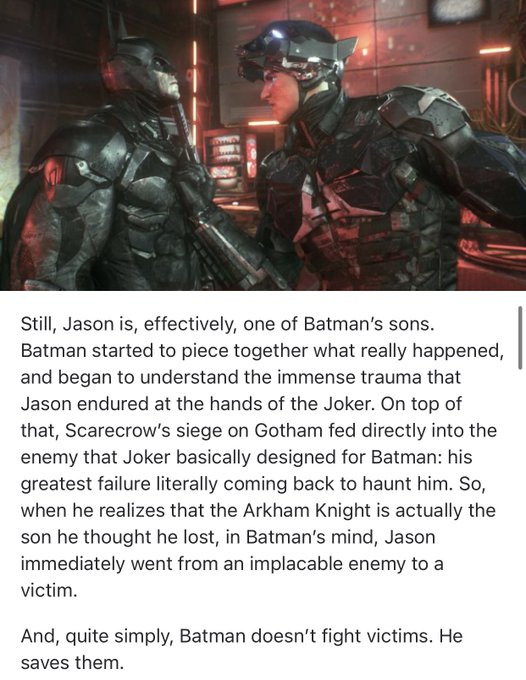
Batman doesn't fight victims. He saves them.
Therefore if Batman is fighting Jason, a victim, he's not acting like Batman. I'm also fine with Arkham Knight being an Under the Red Hood retelling because it's a different story. Comics do this all the time, different universe versions, popular storylines adapted into different mediums. It also works as a commentary on the original story, by showing what Batman could have done to lead to a more positive outcome it makes Batman's choices in Under the Red Hood worse and more tragic because he could have saved Jason, there was still a chance.
So here we have two flawed tragic heroes who are meant to be both pitied and condemned for their actions. One of them is all pity with no condemnation. The other is both pity and condemnation, Batman is grieving, but also he's failing his responsibility towards Jason. Therefore one protagonist works, the other fails utterly.
I'm not saying abusers don't deserve redemption. I'm not saying Enji should have died in order to atone. I'm not saying that the underlying problem with the arc is that they decided to make Enji sympathetic and a focus of the arc. The most important problem is the breaking of one of the fundamental rules of storytelling: Show, Don't Tell.
The Tragic Villain
Not only does The Hellish Todoroki Family plotline fail to make Enji a compelling protagonist, it also fails it's biggest victim. Now, these are both stories that end with the hero failing to save their victim. So if both of these stories have the same ending, why am I saying it failed Dabi, but not Jason?
Well, let me explain.
Dabi and Jason are both villains turned victims. The stories themselves are about this ambiguity. How much should the be held responsible for their own choices? If they are actively harming innocent people, then shouldn't they be stopped? Should they be automatically be forgiven just because of the pain and grief they've suffered, even if they've been causing it to others?
Both characters are also reflective of their fathers because they are too being selfish in their grief, they want their grief acknowledged and so are violently lashing out.
Jason and Dabi both make plays at being vigilantes at first, Dabi wants to inherit Stains will, and Jason Todd wants to be a better bat-man by taking control of the drug trade in Gotham and cutting crime down by executing gang heads. However, neither of them are being honest with this and it's shown through their actions, both of them abandon their original plans.
In the final showdown all Toya cares about is facing Enji on the battlefield, and when he's on the brink of death his mind erodes to the point where all he can do is scream for Enji's attention while his flames get hotter and hotter.
Let's take about Jason first and how his narrative treats him a whole lot better and more sympathetically, with more humanity than Batman. Jason is still held responsible for his choices, he is criticized by Bruce for murdering gang leaders and passing it off as justice. He's also blatantly shown to be a hypocrite. My favorite scene from Red Hood: Lost Days, the official UTRH prequel.
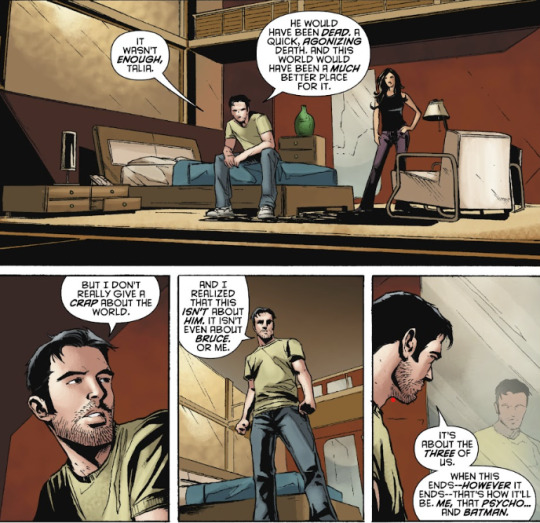
"I want to kill the joker in a cool way. Just sniping the Joker from a rooftop isn't dramatic enough for me."
This scene, and the final scene of UTRH underlines Jason isn't executing criminals because he believes it's the right thing to do, or because of his stated motivation that killing the joker would prevent more future victims.
Instead his every action is to set up a scenario where he makes a selfish demand of Bruce. He wants Bruce to prove to him that he would choose him over being a hero, by setting up his final scenario. Him, the Joker, and Batman. Jason will shoot the Joker. Bruce has a gun. He can either choose to let Jason kill the Joker, or kill Jason to stop him, either way it makes it clear what Bruce's priorities are.
The underlying reason for this is similiar to Bruce. Just like Bruce, Jason is deeply afraid that Batman doesn't love him. That he thinks of him as a failure. (This is Toya's main reason too).
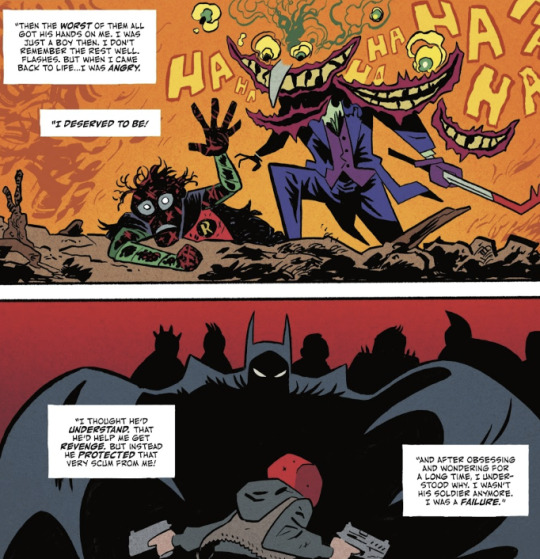
He also interprets Bruce's failure to avenge him to mean that Bruce didn't even care enough to mourn him. If Bruce loved him enough, he'd choose him over the joker, but he's so afraid that Bruce doesn't love him enough that he's going to force Bruce to choose.
Along the way he's also going to behead several crimelords in order to put an exclamation point on that point.
The way Jason completely unravels in the confrontation shows this insecurity, he begins with monologueing about how batman should totally kill people, until his fear that he wasn't important enough, and his grief at losing his father is revealed.
Batman: I know I failed you, but I tried to save you. I'm trying to save you now. Jason: Is that what what you think this is about? Your letting me die. I don't know what clouds your judgement worse, your guilt or your antiquated sense of morality. Bruce, I forgive you for not saving me. Jason: But why on god's green earth is he still alive? Ignoring what he's done in the past. Blindly, stupidly disregarding the whole graveyards he's filled with people. The friend's he's killed. I thought killing me - that I'd be the last person you ever let him hurt. Jason: If it had been you that he beat to a bloody mess. If it had been you he left in agony. If he had taken you from this world. I would have done nothing but search the planet for this pathetic pile of evil, this death worshipping garbage, and sent him off to hell.
Direct statement, it's irresponsible of Bruce to let Joker live after killing Jason and should have put him down to prevent future victims. Reading between the lines, Batman not taking revenge for Jason is a sign that he didn't love him enough, Jason loves Batman more because he would have taken revenge.
As the confrontation continues and Jason's mental spiral worsens, to the point where he can't keep up his pretense of self-righteousness.
Jason: I'm not talking about killing cobblepot, or scarecrow, or riddled, or dent. Jason: I'm talking about him. Just him. And doing it because...he took me away from you.
The father had lost the son, and now the son had lost the father.
Jason's revenge is just a cover, for his grief at losing Bruce. I think this also shows a really positive aspect of Jason's character to humanize him instead of condemning him for his actions to ignore or even justify the suffering he endured: Jason really loves Bruce.
I mean how meaningful is the statement: "Bruce, I forgive you for not saving me."
Bruce has been afraid to hear the whole time that Jason hates him, that he won't forgive him, but Jason loves him deeply. In fact his love is almost equal to his rage because Jason is a deeply emotional person, and these little details make him human and not just like a plot obstacle that Bruce has to face. A metaphor for his past failures.
Dabi is drawn as a crying boy who wants comfort, Jason is shown to be a crying boy who wants comfort through both dialogue and action without us directly needing to be told. It's a heartbreaking line and doing it because he took me away from you and it lands perfectly because the narrative wants us to just look at Jason's grief. It doesn't add an asterisk* even though he was in pain, he's done unforgivable things that can't be justified to undercut Jason's suffering.
In fact that might be another underlying problem with The Hellish Todoroki Family, the narrative tries too hard to make you feel a certain way instead of just presenting things as they are to make you come to your own conclusion. UTRH doesn't support Jason's revenge based serial killing of villains. It doesn't say he's justified to cut off the heads of mobsters. However, it doesn't excessively state "Well, I'm really sorry what happened to you but what you've done can't be forgiven" so we don't have to challenge ourselves to feel too much empathy for Jason's suffering.
Meanwhile even when Toya tries to express his rightful anger and grief, we're always met with someone shutting him down and saying well yeah, but you're wrong, involving innocent people is unforgivable.
As said by @stillness-in-green in the replies to this post:
I think so much harm (in-universe, but the state of the Twitter fandom makes me think the messages are pretty toxic irl, too) comes out of portraying the Heroes as needing to weigh in on the *morality* of the Villains' actions before they gauge "saving" them, when that is not a thing that glorified cops have any business thinking they have the right to do. Demanding repentance before the rehab is so bizarre.
You can say someone's actions are wrong without using it as a factor to consider whether or not their suffering as a human being should be acknowledged, and like I said there's multiple instances of people just yelling at Toya how immoral he is instead of addressing the elephant in the room.
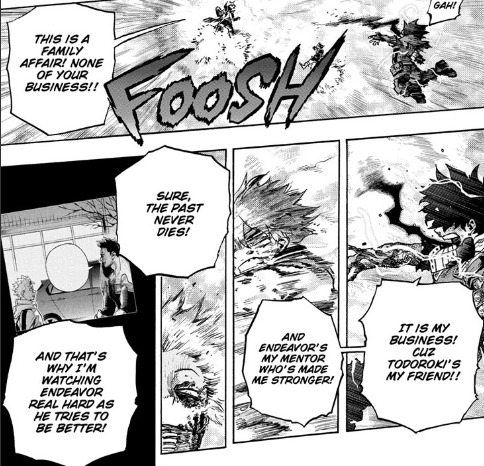
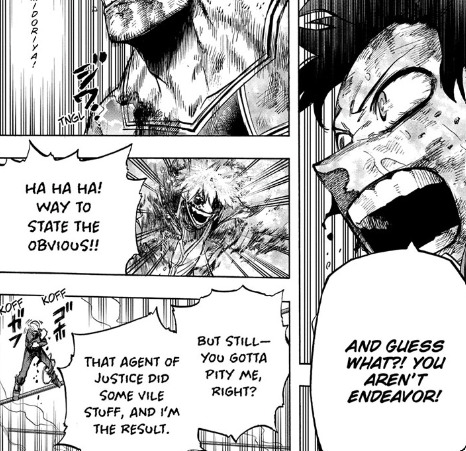
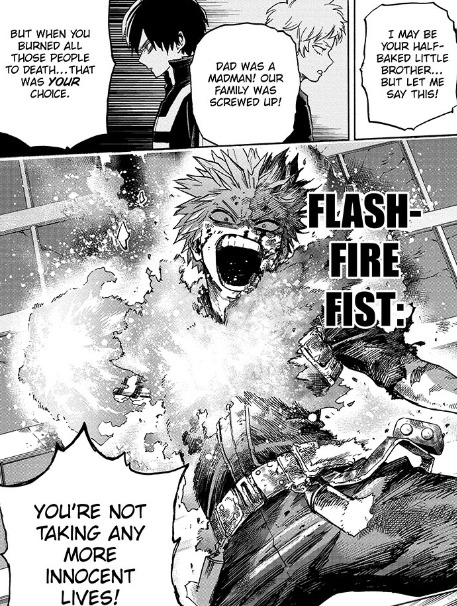
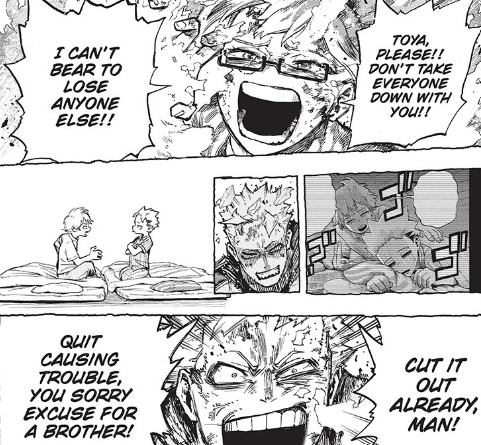
You're wrong, you're wrong, you're wrong, you're wrong.
(Okay, I understand that some people have interpreted this as a show of Honnae and Tatamae, the Todoroki's who are a very repressed household are finally talking about their feelings even if those feelings are selfish and ugly).
(I'm not criticizing Shoto for saying that the people he killed were his own choice necessarily, Shoto is a character who's actions need to be read more deeply than his words he was dedicated to bringing Dabi down without him burning himself any further start to finished. My criticism lies in the fact that Hori uses Shoto as a mouth piece because he thinks we need to be reminded that murder is bad).
However, even acknowledging that time and place man, time and place. They couldn't have done that in the aftermath, when Toya isn't burning to death?
Hey buddy, you're being selfish.
Toya: AHHHHHHHHHHHHHHH I'M MELTING, I'M MELTING.
This is I feel the underlying problem with the way the arc is written, not because the Todorokis are a very traditional Japanese family and there are cultural reasons they express their emotions differently, I'll give a caveat to that it's a nuance I might not understand.
However, I am arguing the actual problem is tell don't show. Horikoshi thinks that we as an audience need to be told multiple times that murder is bad, and we cannot be trusted to interpret that on our own.
Under the Red Hood shows both sides of Batman and Jason's debate, and let's us just come to the conclusion that Jason is in the wrong because revenge isn't justice. Horikoshi reaches no shit sherlock levels of telling us that we're not supposed to approve of Dabi's murders.
it's also a matter of giving Dabi narrative space to express his feelings, like every time Dabi tries to talk he is continually shut down (Shoto does engage Dabi talk to him and listen to why he didn't come back though I'll give him that) and it seems to be to push forward this weird idea that you shouldn't sympathize with the pain Dabi has endured or the ways he's dehumanized unless he does something to prove he deserves to be treated like a human being first.
Jason gets to monologue and make an entire argument, and his argument also shows the depths of his love for Bruce and what a deeply feeling person he is, and how those feelings being hurt and twisted could logically lead to his lashing out.
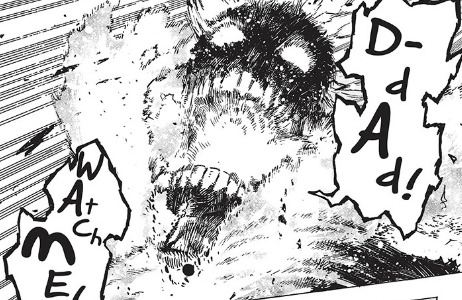
Compare this to Dabi who doesn't get a final monologue, but is instead reduced to a completely mindless state where he just cries out for his dad's attention. He doesn't get to make his argument.
Jason and Dabi both choose to blow themselves up, but Jason gets enough character agency to show this is a deliberate choice he's making even if it's the wrong one. He retains his character agency and ability to make decisions until the end of the narrative.

Jason's also you know physically crying. The end result of the narrative is about wrong choices that both Bruce and Jason make together, and then suffer the consequences together. Bruce watches the same failure play out again and he isn't able to save Jason, Jason doesn't get what he wants, he doesn't get revenge and he doesn't get to reunite with his father. It's tragic for both of them, and brought about by decisions both of them made.
Whereas yes Dabi makes a lot of bad decisions leading up to the last war arc, but in the end his final fate is up to a choice Enji made to not face Toya in the final battle.
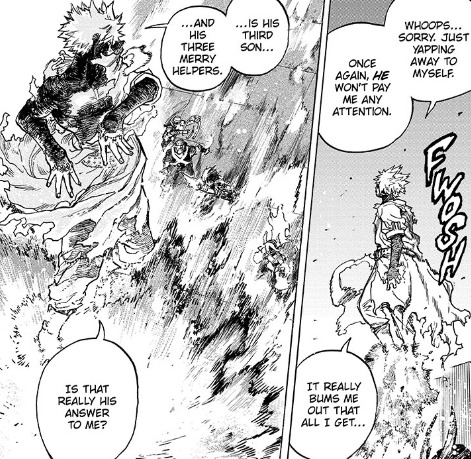
However, while the final consequence of the battle is brought about more by Enji's decisions than Toya's, it's Toya who endures all the suffering and punishment. It's Toya who is in an iron coffin, and doomed to slowly and agonizingly die with all of his skin burnt off unable to move. Toya doesn't even get agency after the arc is over. Enji still has a wheelchair, Enji can still move around, Enji's still fucking rich, he's not in prison for his actions, he as Rei wheeling him around.
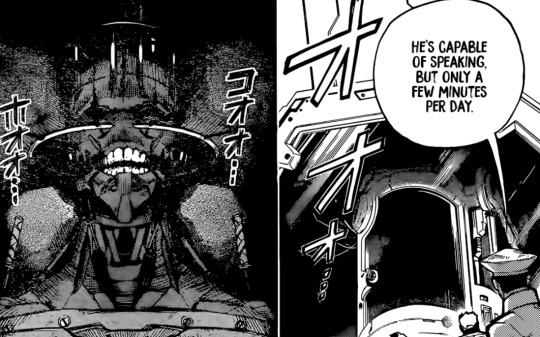
Toya's agency and choices are all taken from him, presumably to serve the plot purpose of making Enji save him to finish off his arc, and then ENJI DOESN'T EVEN SAVE HIM.
Also I think it's important to mention, Bruce's tragic ending is brought about by him attempting to save both, trying to save the joker and Jason with the same action. Whereas Enji's tragic ending is brought about by Enji NOT LIFTING A FUCKING FINGER TO HELP. Yet, it's Dabi who has the lion's share of suffering, and is sentenced to this horrific state of being skinless in an iron coffin and only being able to be awake a few minutes a day with no choice but to waste away.
Bruce is also immediately called out for his actions, by the Joker of all people, you handled this all wrong, it's your fault. Bruce is right to not kill the joker, killing the Joker would not have solved any of Jason's problems, but the fact that he put off facing Jason for so long, and his inability to communicate that he loves Jason is what leads to Jason thinking that the only way to prove Bruce loves him is to force him to choose. It's because Bruce has utterly failed to show him in any other way that he is loved.
Joker: Oh my god, I love it! You manage to find a way to win, and everyone still loses. I'm going to be the one who gets what he wants tonight, badda bing, badda boom."
I'd also like to add that a lot of agency in Enji's actions are taken away too, to make him look more blameless. It's not Enji's fault that he didn't say anything to Dabi during Dabi's dance, he passed out because he had a punctured lung. It's not Enji's fault that he spent a month protecting Deku instead of searching for Toya, he had to protect innocent people. It's not Enji's fault that he didn't go immediately to face Toya in the final war arc Hawks told him not to.
It's not Enji's fault that he made Shoto and Toya fight like Pokemon instead of cleaning up his own mess, and also he feels really sorry for it and as soon as he's done punching the bad guy he'll look after Toya he promises.
Enji does get called out for this behavior but it falls flat because it only comes from the villain AFO, and Toya himself. As I stated above too, the ending is more influenced by Enji's actions not Toya's (because Toya's agency is stripped away until he's mindless) but Toya is the one who has to die while Enji gets to live and atone.
That is the real sticking point for The Hellish Todoroki Family, the way it ends.
Themes Are For Eight Graders
The underlying problem with the whole arc and why The Hellish Todoroki Family fails as a tragedy, is because it wasn't written to be a tragedy.
The above quote is from an interview with the writers of the widely hated Game of Thrones Season 8, which took a sudden tragic turn for Dany's character, gave her an incredibly dehumanizing ending of being put down like a rabid dog by her own lover, an ending that was neither foreshadowed nor did it match with anything written before.
In this meta here by @hamliet it goes far more into depth that Game of Thrones isn't a tragedy, but a piece of Romantic fiction (not a love story, Romanticism is a genre of big emotions, the beauty of life, larger than life ideas hence why it fits well with fantasy genre, it can be sad but it doesn't follow tragic structure).
Dany is a romantic heroine, a deconstruction of the idea of the classic warrior princess trope, and you know a colonizer, but she's not meant to be written as an inherently bad person. There are people who say that Dany was going to die in the original books. I'm one of those people. Me. However, context and framing matters, Dany for all her colonizing ways does genuinely want to do the right thing, so it's likely she'd die a heroic death as a reflection of her selfless intentions (and intentions do matter for fictional characters) whereas in the show she's put down as a villain.
Now watch me I'm going to coin a term for future literary critics to use: Narrative Gaslighting.
Narrative gaslighting is different then Show Don't Tell, where an author has just failed to properly show what they're trying to tell you in the story. Narrative Gaslighting is when a narrative deliberately tries to mislead you, straight up lies to you, or just insists things that did not happen totally happened guys. Much like real gaslighting, Narrative Gaslighting makes you feel stupid for interpreting things a certain way and insists you were wrong all along.
Narrative gaslighting is when Tyrian gives a speech that everyone should have suspected Dany when she burned slavers alive that she was secretly evil and would one day turn on them.
Like, no.
Dany is flawed because she is a foreigner, interfering with the politics of a different country that she does not understand in order to gain enough resources and men to return to her home country and invade that country to exercise her right as a Targeryn to uphold the divine right of kings.
Game of Thrones doesn't mention any of that shit that's in alignment with the previous actions in the story, it's just insisting the very ableist notion that Dany was insane all along and her violence towards other people is the result of her mental illness.
(Also before anyone says, so if she's a colonizer than how can she have good intentions, everyone is Bad in Game of Thrones, they're all waging war to vie for a throne, monarchy is bad guys. IDK how to tell you that Game of Thrones has gray on gray on gray on gray morality).
(Also this aside ties into the hangup of MHA and most popular fandom culture on Twitter, that Dany's moral failings somehow disqualify her from her humanity. In spite of the fact that on top of all of that she's a rape victim, and like, Dany's only on that continent in the first place because she was sold as a bride.)
But here's the same weird subtext that Horikoshi's writing of Dabi. The fact that Dabi was continually victimized and denied human dignity does not need to be addressed, because he did the bad things and didn't atone properly enough for it first.
In essence this random post on the gunnerkrigg court forums I found on the same day the chapter came out, displaying apollo's gift of prophecy.
"When someone is persecuted, it's important to inform everyone about their flaws. That way you don't have to feel anything about all the times that they were denied human dignity."
So, Dany is not written as a tragic hero but a romantic one, we as an audience are both meant to acknowledge her flaws and sympathize with her, not demonize her in an ableist way for being insane, and even if Dany is meant to die the tragic way she dies does not match up with all of the narrative foreshadowing that was built before that.
Like, for instance a lot of POC after the show ended kept telling everyone that Dany's actions in a foreign country were seriously problematic, and not only did the audience not listen but the showwiters didn't acknowledge it with the same subtlety as the books. So those people especially were able to pick up Dany's character flaws, and when the show finally acknowledged them it's not even in the way that critiques of the show were pointing out Dany's flaws it was just "she was insane all along." Not like taking time to go "no matter what the intention, interfering with the politics of a foreign country is wrong."
The problem with the Todoroki arc is essentially the same, down to the ableism (because outsiders continually call Dabi either a maniac or insane Demon without even giving credence to his grievances about hero society he's just reduced to an insane fringe element of society, and Dabi himself is reduced to a completely mindless, childish, insane screaming state where he can't make active decisions).
The Todoroki Arc is not set up to us as a tragic one. The ending is pretty clearly telegraphed to the whole audience. People are not wrong for thinking that Toya's ending would be either rehabilitation like Rei with the eventual hope of being welcomed home, or some kind of house arrest where he still gets to be with his family.
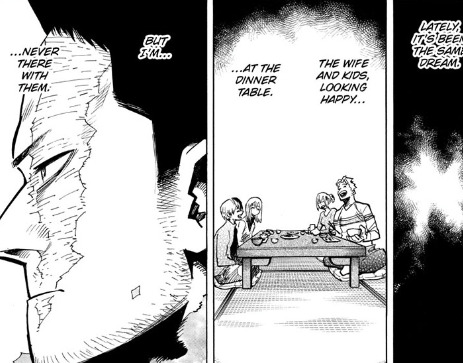
Everyone happy at the Dinner table and Enji not sitting with them.
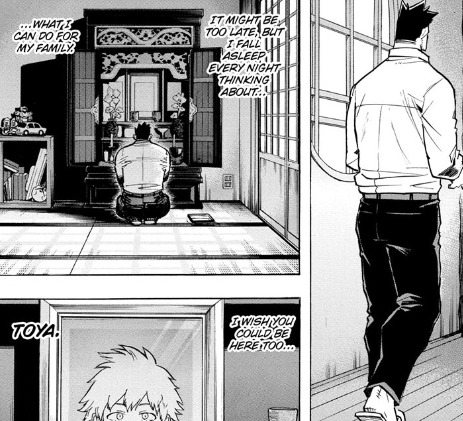
"I wish you could be here, Toya."
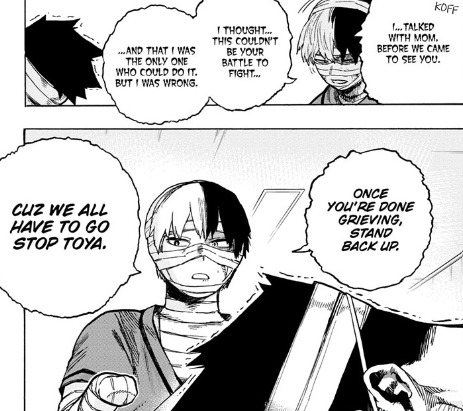
"We all have to go stop, Toya."
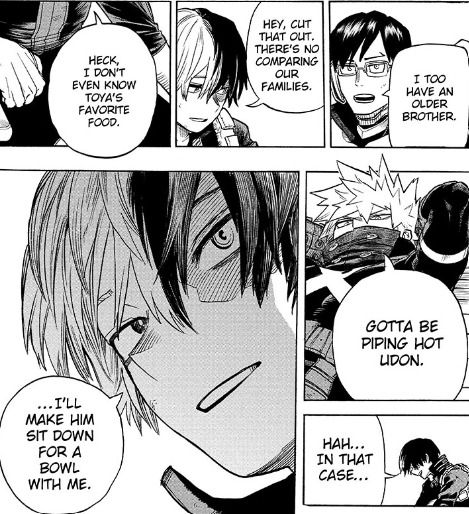
"In that case, I'll make him sit down for a bowl with me."
Even Shoto's efforts to take down Toya non-lethally are rendered completely pointless, because Toya gets back up again and then burns himself alive (completely by his own choice so no one has to feel bad that they failed).
The story sets up the expectation that Toya is going to be brought home and sit down for a meal with his family. Then it makes you feel stupid for going in an entirely different direction. It was always going to end this way didn't you know The Todorokis are a tragedy?
Well, I just spent a very long section of this thesis statement illustrating that if it's supposed to be a tragedy, then it's still not written well.
It's a written as a romantic story of a family healing, and the villain getting saved, only for the villain not to be saved and the story to just keep on going like not getting saved isn't a huge failure. This is something that should permanently destroy the main characters, that they got the chance to repeat Sekoto peak and be there this time and they all utterly failed. I feel bad for Shoto most of all because he did everything right, and he still loses his brother, but does the story show that?
The problem is the story is blatantly lying to you about the fact that Toya was somehow saved, even though he LITERALLY LOOKS LIKE HELLRAISER. To quote Codenamesanzanka again:
But I feel the story couldn't give us that because it will remind the reader and everyone just how much Touya will be missing. In-story, talking any more will overburden Touya's heart - and how apt is that metaphor? So let's talk about how we'll talk, but that's all that's allowed here for this scene. Else we'll see how unfair it is that Touya has to be confined to this room, he isn't with his family and they have to come to this prison just to tell him about their day, and soon he will be gone. Details make it real, and it would've exposed the lie that Touya was saved in an actual way. The story knows it too - "this extra time Shouto gave us." This is all 'extra', and not the core. [...] If the story was sincere that this is a case of "it's simply too late" - as it should be!!! imo, to really drive in the clear point that they failed, they did not get the save they wanted, because that's the truth - the tone of the chapter isn't tragic enough for that. The tone is going for 'Making Peace With This'. We've skipped the stages of grief and all we have is acceptance. The characters have accepted this, and so must the readers as well.
Therefore it's narrative gaslighting, the story is making us doubt our perceptions and trying instead to manipulate us to feel a certain way. We don't have to question the unfairness of Toya's fate, because look at all the people he's hurt, and look how Enji is atoning and taking responsibility.
The story builds up the idea that Enji will choose Toya. That he will choose being a father over being a hero. Enji doesn't do that, and it's Toya who suffers the horrific, painful consequences while Enji gets off mostly scott free. Mind you it's also ableist to suggest that being in a wheelchair is some sort of life-ending consequence like he's fine. The story even goes out of its way to say how avoidable this ending could have been if Enji or Rei or someone lifted a single finger to give Toya the acknowledgement he wanted, and then gives it a "Too little, Too Late" conclusion but doesn't acknowledge that this is where it's ending and instead tells us that Enji has successfully atoned.
"Everyone's watching me. So this is what it's like. If it was such a simple thing, then why not sooner?"
If it was going to turn out this way Toya should have just died here, not because death would somehow be a mercy compared to life in prison, but because the Todoroki Family doesn't deserve to get to pat themselves on the back. If they let Sekoto Peak happen a second time, then they should have to deal with the consequences of that.
It would be consistent is my point. This is written as a "Too Little, Too Late" kind of ending, but we don't get the emotional response from the Todorokis that they've let Toya die a second time.
On the other hand, UTRH has the exact same tragic ending but it doesn't make me angry because it's honest about it. The Todorokis let Sekoto peak happen a second time. Batman let Death in the Family happen a second time, but look at how even the narration and comic panels of the story acknowledge it.
"Fate is a funny thing. It swells up like a raging current and we are forced to travel. It provides us no exit. No deviation. It drops us in a bottomless ocean and compels us. We either swim, or drown, and sometimes as we struggle against the tide, a great truth arises."
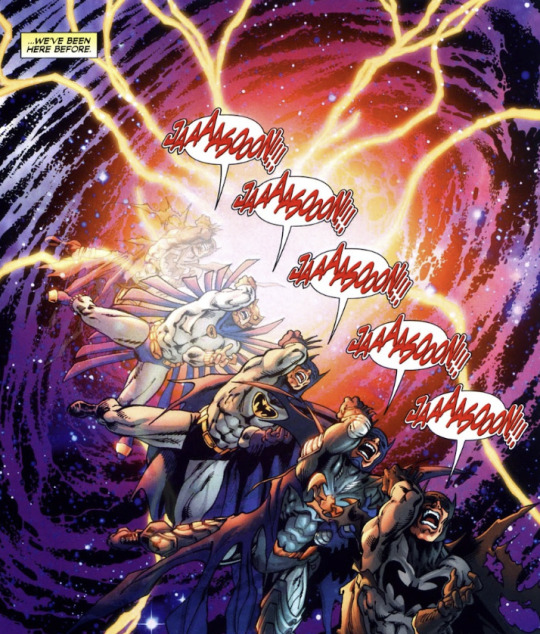
One ends with Enji meaninglessly stating that he'll spend the rest of his life atoning for Toya and watching over him (which I guess will be like two months tops) for the fifth time. The other ends with Batman being lectured by the Joker of all people of how he chose wrong and being forced to watch once again as a warehouse blows up, and he's completely helpless to save Jason.
UTRH ends with the message that Batman sucks, Enji's atonement arc ends with Natsuo calling him cool for atoning and UTRH makes me like Batman way more as a character. Whereas at this point I feel nothing from the Todoroki Family, except for a disgust for the way that Toya not only has to die, but has to die a slow, gruesome death while the rest of his family walks away with the small comfort of "oh at least we'll get to say what we need to say before Toya passes."
Especially with the fact that Toya's greatest fear was that when he died, he died meaninglessly because his family never grieved him and all moved on with their life. I guess we don't have to analyze how gross the underlying message that criminals don't deserve to be sympathized with because themes are for eighth graders.
EPILOGUE
The post is finished but apparently everyone expects me to cover every single possible angle even in posts this long.
You didn't address the cultural aspect. Under the Red Hood is a western story, and Todoroki Family is based on eastern concepts.
The post isn't about that. The post is long enough I can't cover every single topic. Here's someone who covered that topic thoroughly. This one discusses more about the nuances of collectivism.
Also, since the Todoroki Family obviously copied Under the Red Hood's homework, it warrants a comparison. Especially since it seems to critically misunderstand what made the original work.
Which is a valid form of Literary Criticism, as Ursula K Le Guinn once said:
It doesn’t occur to the novice that a genre is a genre because it has a field and focus of its own; its appropriate and particular tools, rules, and techniques for handling the material; its traditions; and its experienced, appreciative readers—that it is, in fact, a literature. Ignoring all this, our novice is just about to reinvent the wheel, the space ship, the space alien, and the mad scientist, with cries of innocent wonder. The cries will not be echoed by the readers. Readers familiar with that genre have met the space ship, the alien, and the mad scientist before. They know more about them than the writer does.
The Todorkis aren't all to blame for Toya. Natsu, Fuyumi and Shoto are innocent:
You're right. It's just easier to refer them as the Todorokis then specifying "Enji and Rei" each time.
You didn't mention Shoto once in this post:
I have no cricism for Shoto's role in all this. In fact I think he's the best written part. I praise it here.
Shoto is a good boy, and he deserved to spend more time with his brother. The fact he won't be able to sit down and have dinner of him, is the greatest tragedy of them all.
#mha meta#mha spoilers#mha 426#mha 426 spoilers#shoto todoroki#dabi#toya todoroki#enji todoroki#under the red hood#jason todd#bruce wayne#batman#mha critical#todoroki family
610 notes
·
View notes
Note
hi! idk if you take requests currently. I'm new around here, but I've read. Everything in your whole masterlist. And I love your writing so much. Um. So!
I really love. Flirty villain with the power to mess with people's emotions to like, calm them or seduce them or whatever he really wants X hero who should hate it but secretly is really into it because it's a release of control for him and he's exhausted
“You’re back,” the villain stated. The hero was…an interesting person. Although they had avoided the villain in the beginning, now they were crawling back to them — nearly desperate.
A desperate hero was generally easy to control, the villain was fully aware of that. They didn’t even need their powers to do so. So, the advantage, the position of power the villain found themselves in was anything but unappetising.
However, there was something in their stomach, something that twisted whenever the hero was standing in front of them.
“…I’m sorry to bother you again…I, I don’t know, maybe I can pay you next time?”
“Next time?” The hero started blushing and unfortunately, the villain was very amused by it.
“Oh, sorry, I—”
“Come in and sit down.” The hero stared at them with those horrible puppy eyes, jaw slightly dropping.
Sometimes, the villain’s heart would start beating fast enough to worry them. Mostly, when they looked at the hero for too long. That wasn’t only distracting, it was also incredibly annoying.
“Thank you,” the hero said and they smiled that sweet smile that was usually reserved for scared civilians as reassurance.
Was the villain even worthy of such a smile?
The hero sat down on the villain’s couch and folded their hands in their lap.
“Anxiety?” the villain asked.
“…yeah, it got really bad again.”
“Work?”
“Yeah.”
Silence.
The villain stared at their nemesis. Lamentably, they could see how well-built their nemesis was. Them being attractive was becoming an actual problem since the villain was slowly getting the feeling they were the one being seduced.
They took in a deep breath. Their powers demanded physical contact.
Which made it quite intimate.
The villain didn’t know how to feel about that.
“What do you do outside of work?” They walked behind the couch. Last time, they had held hands.
The villain swallowed.
This time, they touched the hero’s neck. They were gentle, but the hero took in a sharp breath.
As usual.
“Voluntary work, mostly.”
“God, you’re disgusting.” As response, the hero laughed quietly. Apparently, they were already relaxing.
“I also work out.”
“Yeah, I figured.” The villain let their hand wander under the hero’s shirt, gliding over their collarbone. “Do those things calm you? Or are you thinking about work the entire time?”
“…it…” The hero took in a deep breath and the villain leaned over, their lips close to the hero’s ear.
“Easy, take your time…” The hero let their head fall back. They let out a somewhat satisfied sigh that sounded a lot like the villain’s name.
The villain’s eyes widened.
“Don’t be inappropriate now,” the villain mumbled. The hero smirked.
“Sorry…nothing calms me like you.”
“You’re being a little careless, don’t you think? Maybe I should keep you to myself, you’re certainly pretty to look at,” the villain said, pushing their voice deliberately deeper. They let their fingers go up: following the hero’s throat up to their chin.
“Gosh, you can be so mean.” Suddenly, the hero grabbed the villain’s wrist and started guiding the villain’s hand.
Too stunned to speak, too surprised to do anything, the villain simply let them do whatever they wanted, only for the hero to stop on their chest. Right under their palm was the hero’s heart, the villain realised.
“I loathed you so much when you did this the first time,” the hero admitted. “I don’t know if you remember, but we were fighting. You were teasing me a lot. You even slapped my ass, I think.”
The hero rolled their eyes, smirking.
“Well, you deserved it,” the villain said. They could feel the hero’s heart beating under their skin.
“Hmm. You remember.”
“Of course.”
“I hated how safe I felt.”
“You’re not really safe with me,” the villain reminded them. They could betray them anytime. Capture them, keep them here, kill them…
“You’ve never taken advantage of me when I’m like this,” the hero said.
“Yes, but that doesn’t mean anything.”
“It means something to me,” the hero said. Even though their eyes were sleepy, they looked quite serious. “I love it when you’re soft.”
They raised their hand and touched the villain’s cheek.
The villain’s innards were melting. It was painful. So damningly painful.
“I’m exhausted,” the hero whispered. “Can I stay here a little longer?”
The villain couldn’t really breathe. They swallowed. What on earth was this hero doing to them?
“…yeah.”
It was one word, but their voice cracked several times.
#shorty sorry#writing snippet#heroxvillain prompt#heroxvillain snippet#heroes and villains#hero#villain#hero x villain#heroxvillain#an answer for an ask#request#flirty#suggestive
217 notes
·
View notes
Text
Valentines Day Blues || Worst!Logan x Reader
summary: Logan has never really cared about Valentines day until he met you, but despite his best efforts nothing seems to be working out for him.
warnings: angst to fluff, a little spice at the end but no smut, logan's self doubt and slight anger issues, happy ending.
wc: 2.8k
a/n: This is my entry for Loveuary event by @lubdubology and @yxtkiwiyxt! I had pick worst logan my love and add some angst bc I love angst but it all works out for our boy <3 Happy (Early) Valentines day guys!!

Sometimes Logan wonders why he even tries anymore. It's like the world is out to get him specifically. All he wanted was to plan one perfect day. Just one day where he can prove to you, to himself that he's more than a fuck up.
Logan has never really cared about Valentines Day. He's celebrated before. You know gone to dinner, to the movie, had a few hook ups. When he lived at the mansion he remembers the heart decorations and all the red and pink. The kids sharing valentines and watching them experience their first love. But thinking back on his long life there just wasn't anything about the holiday that stood out to him.
For Logan, things just never seemed to work out. Love wasn't his thing. He had lost the ones he loved. He hadn't thought about it, felt it, for years. It never even crossed his mind anymore. Too afraid of losing yet another lover. He went about his life, a shell of the man he used to be. A disgrace to the name X-Men and a monster parents tell their children about at night.
Until Wade showed up and everything changed. He's a hero now, well he's not a villain in the eyes of citizens. He'll take it. He could be free to live again, to make friends, enjoy life. To heal and live in memory of his fallen friends rather than run away from the pain. He doesn't think he'll ever forgive himself, but he can start by being a better man.
It's been so long since Logan felt love that he didn't even recognize it at first. He didn't understand why his heart beat faster, why he felt sweaty, why his stomach twisted and turned by just your mere presence. He thought it was something else.
Maybe you're a mutant and were using your powers on him. Maybe you had heard what he had done and decided that he wasn't worthy of redemption. He avoided you like the plague. Unable to shake whatever you were doing to him no matter how hard he tried. It wasn't until Wade slapped him on the back of the head and spelled it out in big bold letters.
He had a crush.
Logan just scoffed. A crush? That word...It felt so juvenile. A crush is something between two kids who stare at each other from across the classroom. A crush is small and innocent and Logan is far too old and far too worn to be crushing on Wade's friend. But he could only lie to himself for so long. It wasn't a crush. No that wasn't the right word.
He was in love. When he started creeping back into your life it hit him full force. Took him by the neck and shook him until it all clicked. He longed for your attention, to be close to you. To make you laugh, to watch you smile. He wanted to hold you at night, to hear your voice when he drifted off to sleep and to wake up the next morning with you by his side. He was utterly fucked.
It was funny really. Especially to Wade, I mean how clueless could a man be? You would think two hundred years of experience would mean he could pick up on these things. But Logan doesn't notice those things anymore.
He's so in his own head he never even noticed that you were mirroring his feelings. That the mere sight of Logan was enough to make you weak in the knees. That his laugh, as rare as it was to hear, was music to your ears. That you were heartbroken when he started to avoid you, anxiety filling your brain about why the man just couldn't stand to be around you.
Wade treated it as his own rom com. Making popcorn and watching the longing looks shared between the two of you. Except Wade wasn't a patient person and he wasn't trying to watch a slow burn where both of you refuse to talk. So he pushed you two together. Spilling both your secrets right in front of each other and walking away like he didn't just change your lives forever. But it worked. You had to give him that at least. Even if Logan really didn't want to give Wade any credit ever.
Logan remembers that night like it was yesterday. You took his hand, so nervous to look him in the eyes. He locked your fingers together, squeezing your hand softly and tilting your chin to look at him. Colossus passes by and using the man as cover he kisses you. He could hear a faint "Oh come on! What is this Disney Channel?" From Wade but he pays it no mind.
Since that day Logan has vowed to spend every moment being the man you deserve. You tell him that you love him but sometimes it's hard to believe. How could someone like you love a man like him? Your heart was too good for him. Too bright to be with a man who wasn't even sure he had a heart just a year ago.
But nevertheless you're still here and Valentines day is fast approaching. This is his chance to show you how much he loves you. To buy you the perfect gift and plan the perfect date. If he could do this, he could be just a fraction of a man good enough for you.
He wanted to make you breakfast. To dress up nice and proper for once with flowers in his hands. A picnic at the park. To watch the sunset together all wrapped up in blankets. A night time drive that ends in a passionate night.
But life has other plans.
The day starts with a broken alarm clock. Logan groans as he wakes up, reaching out for you only to feel an empty bed. He shoots awake, looking at the clock to see that it was well past breakfast time.
"Fuck!" He hisses as he throws the covers off and scrambles to the kitchen. To his dismay you're already awake and eating. His heart sinks, failure number one.
"Hi honey, how did you sleep?" You ask sweetly as you wrap your arms around his waist, sighing happily as you hug your boyfriend.
"Alright, I meant to wake up earlier than this." He mumbles as he holds you tight. He tries not to show his disappointment as he covers it with a smile. He still has his other plans, the day is just starting.
"That's okay, I'm glad you were able to get some rest." Logan huffs but nods along with you.
He pours himself a cup of coffee. He suddenly realizes to tell you something and pulls you back into him, kissing you fiercely. You squeak in surprise but melt into his embrace.
"What as that for?" You tease as he pulls away. Logan shrugs and kisses you again.
"Happy Valentines Day Sweetheart." He purrs. You giggle as he buries his face in your neck.
"Happy Valentines Day Logan."
"Now, I have the whole day planned so go get ready." His disappointment from earlier fading as he thinks about the rest of the day. "How romantic of you." You kiss his cheek and turn to go back to your bedroom. Logan smirks and gently slaps your ass as you walk away.
"Logan!" You scold him but he just grins wider.
"Sorry, couldn't help myself."
Logan packs the picnic basket as you get ready. He made sure to buy all your favorite things and handmade chocolate covered strawberries last night after you went to bed. Those were romantic right? The clock ticks by faster than he realized and it dawns on him that the flowers he ordered have yet to arrive. His phone buzzes and he growls as he checks it.
Of course.
A text from the florist shop that they can't complete his order despite the fact he ordered these weeks ago. Fuck. Well maybe he can grab something on your way to the park? No he can't buy them right in front of you. Plus what store even has flowers right now. Maybe he can cut a few from the neighbors garden. They won't miss a few roses.
"Logan? Everything okay?" He snaps out it and shoves his phone back in his pocket.
"Just fine sweetheart," His eyes land on you and he lets out a low whistle.
"You trying to kill me or something?" He says with a smirk as he takes in your outfit. Fuck you're perfect.
"This old thing? I just had it laying around." You joke.
You grab onto his belt and pull him into you, his lips capturing you in a hot kiss. His hands slowly slide up your body. You could get lost in this kiss forever.
A loud boom breaks you apart. Your heads whip towards the window and see the sky darken before your very eyes.
"You've got to be fucking kidding me." Logan growls as he lets go of you. Stalking his way to the window to see rain pouring down outside. There goes the picnic plans. He slams the window shut. Frustration taking over his mind.
"It's supposed to rain all day," You say as you check your phone. You notice Logan's mood turn sour and you start to get worried.
"Of course it is." He scoffs. Logan searches for something in his brain to fix this day. Maybe he can just drive out of the city and you can still go on a picnic or watch the sunset.
"Logan are you okay?" You ask softly. He grunts as his phone buzzes once again in his pocket. Wade's picture flashes up on the screen and it takes everything in Logan to actually answer.
"What."
"Hey so...I might have borrowed your car last night for reasons that are not important to you and well lets just say its going to be out of commission for a couple days k sorry gonna hang up before you process this bye love you!" Wade speaks fast and hangs up faster.
No breakfast, no flowers, no car, no park, no sunset. Just fucking great. He can't even do one fucking nice thing for you. Logan crushes his phone in his hands without even thinking. He's done, he just. He doesn't get it. Why can't he just do one nice thing for you?
"Logan!" You hurry over and try to comfort him but he just holds his hand up.
"What's wrong?" He just sighs, stands up and shoves his hands in his pockets.
"There are no plans anymore. I'm sorry." He says lowly. Disappointment seeping into his tone.
"I had everything planned, I had the perfect day. A day where I can just... you know what? Forget it. I don't even know why you bother with me anymore." He mumbles.
He ignores the calls of his name as he walks out the door and leaves. The rain soaks him right to his metal bones. He just sits on the grass. Letting the rain hit him. Dramatic? Maybe but he's defeated. Just. Purely defeated.
His inner thoughts swarm with attacks, the happiness he had hoped to feel was draining. Being replaced with self doubt that can only scream that he's not worthy of you, not worth the love.
"Logan you get your ass back inside right now!" Your voice cuts through the harsh patter of the rain. He turns to see you marching forward, your pretty clothes all ruined now as you walk over to him.
"Go back inside, you're going to get sick." Logan says with concern but you don't care.
"No, not until you talk to me." You say stubbornly. He huffs and takes off the jacket he had put on earlier to hold it above your head. Rain pelts his back but its stopped hitting you.
"It's nothing."
"Stop that! Stop shutting me out Logan. Look I know this is hard, that sometimes you get wrapped up in your own head. But that's why I'm here." You grab his face, making sure he can't get away from you. You don't know how many times you need to drive this into his thick skull but you will if that's what it takes.
"A bother? Do you really think I'm just putting up with you? I fucking love you, you idiot! I don't care about if the date is perfect or if you get me flowers or chocolate. I care about you."
"Everything got fucked up today sweetheart. Literally everything I wanted was ruined. Don't you think that's a sign? That the universe is trying to fucking tell me something?" You scoff and shake your head.
"Tell you what? Huh? What could the universe possibly tell you that I can't. I'm telling you right now. That you are the love of me life. I love our lazy mornings, the soft kisses, the movie nights, the way you make my day brighter and my stomach flutter. Fuck the universe. Logan, I'm right here." Logan does so much for you that he doesn't even notice.
He loves you and his love is more than enough. It bleeds into everything he does. The way he looks at you, how he talks to you, the pure love and adoration in his eyes.
"I wanted today to be perfect for you. I wanted to show you that I'm worthy of every part of you." He confesses.
You pull him in for a kiss. Not caring if he drops the jacket that was once covering you. You let the rain fall as your lips move passionately with each other. Logan groans as he wraps his arms around you. Your hands reach up to grab at his wet hair, pushing it back and running your fingers through it. His hands grip your waist tightly, pulling you impossibly close to him. Reluctantly you pull apart, needing to catch your breath. He's got this dopey smile, his eyes softening as you rest your hands on his chest.
"You idiot, you're already are worth that and more." You whisper. Thunder rolls through the sky and you tug on Logan's hand.
"Come on, let's go back inside. I don't need to find out if your metal skeleton attracts lightning." He chuckles but follows you back inside. After drying off and changing back into your pajamas he finds you trying to push the couch back.
"What are you doing?" He asks as he walks over and picks it up with ease.
"Show off." You mumble. You grab a blanket it and lay it on the floor.
"You wanted a picnic, so let's have one." Placing a couple pillows on the floor, you and Logan sit in your living room with the food he had packed earlier.
The sound of the rain hitting the windows was oddly peaceful. Your heart warmed at the sight of everything Logan had packed. He really put thought and care into this. You were practically in his lap at this point. His hands wanting to be on you at all times.
"Here," You lift a chocolate strawberry to his mouth and he takes a bite.
"Sweet, not as sweet as you though." He says with a cheeky smirk.
"Cheesy," You roll your eyes playfully. He chuckles, his thumb rubbing the side of your mouth where some chocolate was. His face softens, eyes brimming with an emotion you can't read as he stares at you.
"Hey, I love you."
You're the best thing that's ever happened to me. You're everything. I want to wake up next to you for the rest of my life. Logan feels it all, you're it for him. But he doesn't know how to say it quite yet, so he settles for I love you and hopes you understand how much he truly means it.
"I love you too Logan, more than anything." He presses a kiss to your cheek and peppers them down to your jaw. His teeth grazing your pulse point.
"There's still one more thing I had planned that we can do right here." Logan purrs. You giggle as he flips the two of you so that you're on your back, your head on a pillow.
"Oh really?" You tease as you slip your hands up his shirt.
"Happy Valentines day Logan." You hum as he nibbles on your neck.
It's not the day he had expected to have, but it's turned into one he'll never forget. Maybe this holiday isn't so bad. He smirks as he sits back on his knees, still in slight disbelief that you're his. You know what? The universe can suck it. Because he's happy and for once he won't let anything get in his way.
"Happy Valentines day sweetheart."
Here's to many, many more.
#klloveuary2025#logan howlett#logan howlett x reader#logan howlett angst#worst!logan howlett x reader#worst!logan howlett
348 notes
·
View notes
Note
PLEASE PLEASE PLEASE EXPAND ON DAMIAN AND FD!MC'S RELATIONSHIP
like i know talia had told damian abt fd!mc,,, and alot of other stuff butnansjswjwnowns god i dont know how to articulate thoughts that well but
damian and fd!mc 🙏
— 🎭
Oopsies got derailed because nothing was really coming to mind....
Taglist: @dragondevinity, @lonely-star2044, @sheep-from-rad, @ilxandra, @thethingwiththefeathers, @star-wars-lycanwing-bat, @sackofsadstuff, @zonked-times, @paastaboi, @venfia, @fantasy-angelo, @linaisadream, @shirp-collector-of-fixations, @roseapov, @alittletiredcry
You and Damian are both your mother's child. You both carry what your mothers have taught you. The good, the bad, the messy and sharp. It's part of the reason the two of you get along.
Damian does not accept people readily. Even with the stories his mother tells him of you, he spends a good amount of time observing you for himself when he first arrives and especially after he finds you do not consider yourself family. What he finds is that-
You are only ever as close to others as you allow yourself to be.
You push and dig your nails into everyone's life whenever you want to. Becoming Robin whenever you feel is necessary, approaching his father and demanding for him to spend time with those under his wing (demanding him to be a father and not just a hero), arranging for Damian to "hang out" with his father's wards so they can "get along" and so on. You're everywhere. You'll mould everyone's relationship into what you want it to be, involve yourself to the degree you think is needed and then-
and then you leave.
You pull away. You linger in the periphery, watching as everything falls into place, like a director of a film who can never appear on the screen with the 'happy' family, hiding in the wings as the curtain call ends.
You can try to live in denial forever, you can come around to the manor every holiday, you can sleep in your room in the family wing, you can call yourself "Tim's sibling" and "a family friend" all you like but Damian craves more.
Sometimes he thinks you're selfless to the point of selfishness. And maybe he's selfish too, for wanting everything you've given him and more. The Al Ghuls have always been like that. His mother, his grandfather, himself.
Asdasldkhaslka listen, it's about how everyone, including Damian, takes comfort in your love, in knowing you're always there for them to fall back on. It's about how the love you keep giving makes it difficult for them to realize how you thought you weren't family until you said it out loud.
It's about how you can't accept the love you think isn't yours to take but you keep giving. It's a responsibility you tie yourself with. Maybe you think it'll make you worthy of being love, of actually existing, in this universe.
And it's about how Damian had thought that he was sent to his father for a purpose (becoming Robin) that he needed to fulfill in order to stay. And how he was shown that he didn't have to do anything to be loved. And about how he sees some parts of who he is meant to be in you.
You are his sister. He had already decided. And he wants to be your brother, wants your acknowledgement more than anything else you could give him.
So, stop pretending like everyone around you doesn't care about you, okay? And accept their love for what it is.
#so many siblings trained by assassins and damian picks the one that hasn't been trained by one to be like “yes we are alike”#also he and cass are absolutely corroborating in their observations of you#🎭 anon#mumblings#answered#ask#family dissonance au#writing#my writing#dc#dcu#batfam#batfamily#dc x reader#dcu x reader#batfamily x reader#batfam x reader#damian wayne#robin
171 notes
·
View notes
Text
New Details on DA4 from this IGN article: "Dragon Age: Dreadwolf Is Officially Being Renamed, With Gameplay Reveal Set for June 11 - EXCLUSIVE"
"BioWare confirmed that The Veilguard will feature seven playable party members, and that it will feature “fun and fluid, moment-to-moment combat” while continuing to center strategy via the unique powers of each companion.
BioWare general manager Gary McKay explains that while Solas is “still very much a part of the story of Dragon Age: The Veilguard,” the team wanted a title that reflected a “really deep and compelling group of companions.”
“One thing that’s important to remind fans is that every Dragon Age game is a new and different experience and this game, more so than ever, is about you and your companions – a group that you must rally to fight by your side,” McKay tells IGN. “We can’t wait for players to meet, connect and form their own personal relationships with the unique companions that make up The Veilguard. That’s the spirit of this game…of this story. Choosing who will join you on your adventure, fight alongside you, and be there by your side in the end.”
McKay claims that the name change wasn’t a matter of focus testing, which commonly informs decisions like these. He even goes so far as to admit that sticking with Dreadwolf might have been easier.
“We actually think sticking with Dreadwolf would have been the safer choice – ‘Dread Wolf’ is a cool name after all!” McKay says. “In the end, it was most important for us to have a title that was authentic to the companions that are the heart of this adventure we’ve created. We’ve worked throughout development to create really incredible backstories for each companion that intersect with the main narrative in meaningful ways.”
As for why it’s not simply named “Dragon Age IV,” McKay says it’s for the same reason that Dragon Age Inquisition wasn’t called “Dragon Age III: Inquisition.”
“Every game in the series tells its own unique story and the title is an important element to help set the stage for the next standalone adventure inclusive of its own hero, companions, narrative arc, villain, setting, etc,” he says.
Asked what it means for BioWare to finally be able to show The Veilguard to the world, McKay said, “As the studio head and executive producer, it’s been incredible to see the journey, resilience and passion that this team continues to bring every day. We have an incredible group of both BioWare and Dragon Age veterans who have been with us for years, as well as new faces and voices that love the series who have helped to create an unforgettable experience we feel will be worthy of the Dragon Age name.”
So who exactly are the Veilguard? In the lore, the Veil is a barrier between the physical world and Fade, which is Dragon Age’s spirit realm. Solas, who helped create the Veil, now wants to destroy it. Hence, as McKay puts it, “the Veil needs guarding.”
While acknowledging that the why and the how is definitely spoiler territory, McKay says, “The biggest clue I can share is that you and your companions – that make up The Veilguard – are central to taking down a new evil threat unleashed upon Thedas. It might not just be Solas.”
McKay isn’t quite ready to reveal the party members quite yet, but does provide some hints on what to expect, including some initial info on romances.
“We spent a lot of time making our companions feel authentic based on their own unique experiences within this larger fantasy world, which in turn makes the relationships you form with them feel even more meaningful. We’ve tapped into Dragon Age’s deep lore and explored its most iconic factions to bring each of the seven companions and their stories to life,” he says.
“I won’t spoil next week’s reveal but I can say we’ve created a story where you can impact the world and the companions that surround you. Player agency is important to the Dragon Age: The Veilguard experience and allows each player to form unique personal connections with their companions of choice. And, yes, you can romance the companions you want!”
McKay says the decision to pare the number of companions from nine to seven is mostly down to it being the “right number for the story we’re telling.” Each one is intended to represent a unique faction or element from Thedas, and will feature their own arc with “stories of love and loss, each with meaningful choices and emotional moments.”
He continues, “As you accompany your companions to unravel their backstory and earn their loyalty and friendship, you’ll visit more regions of Thedas across a deeper variety of biomes than any Dragon Age before it.”
McKay mostly sidesteps questions of how Inquisition’s characters might fit into The Veilguard’s story, though he does confirm that it will once again feature an original protagonist similar to The Warden, Hawke, and The Inquisitor, noting that each Dragon Game has its own standalone story with its own thread and conflict.
“Games across the Dragon Age franchise are never designed as a game-over-game continuous storyline. There are familiar arcs, factions and heroes important to the overarching Dragon Age universe that weave through the new story we’re telling,” he explains. “The previous games, characters and events aren’t the anchor of Dragon Age: The Veilguard it’s about your adventure with a brand new cast of companions that you must rally to fight against a powerful force.”
He once again teases another villain beyond Solas: “I don’t want to get too deep into spoiler territory but I can say that the Dread Wolf is not the only god players need to be worried about.”
When The Veilguard is finally revealed on June 11, BioWare’s presentation will include 15 minutes of gameplay from the opening moments of the game, which will help set up the story. On the gameplay front, McKay says that The Veilguard’s combat was a “big area of focus” and something the team wanted to push forward. Among other things, McKay says that The Veilguard will feature an ability wheel designed to give players more direct control over their characters.
“As an RPG, strategy in combat is important as you bring two companions to every fight. Each companion brings unique powers and abilities that have a direct impact on how you choose to take down the enemies at hand,” he says. “To add another layer to that strategic element, we’re introducing a new ability wheel where you can pause the action and set up your next move – whether it’s your companions’ abilities or your own.
“The ability wheel opens up a huge amount of strategic possibilities, giving players the ability to control the flow of combat and link powerful combinations of abilities between players and their companions that can quickly turn the tide of any battle. We think we’ve found an exciting balance between fun, fluidity and strategy for every encounter.”
“This is a game and experience that continues BioWare’s tradition of single player RPG storytelling set in the epic fantasy world of Thedas,” McKay says. “We know Dragon Age fans and the community have been waiting a long time for the next game and we could not be more excited to share our gameplay reveal on June 11.""
[source] (emphasis mine)
#dragon age: the veilguard#dragon age: dreadwolf#dragon age 4#the dread wolf rises#da4#dragon age#bioware#video games#long post#longpost#solas
480 notes
·
View notes
Text
I feel like Harry and Ginny both like the idea of each other rather than actually knowing each other. To Harry Ginny represents normalcy and safety - the life he longs for but may never have, the world where he has no special destiny and can just life a regular life and have a regular romance. He doesn’t really respect Ginny or bring her into his life or seek strength for her the way he does from Ron or Hermione or Luna. She’s an idea more than an actual presence in his life.
and for Ginny Harry is the Chosen One TM. This larger than life hero that she’s obsessed with being worthy of. The scene in the end of book 6, where she says that she always knew he wouldn’t be happy unless he was hunting. Voldemort just shows how much she puts him on a pedestal and fundamentally does not understand him as a person. That scene is also notable because she doesn’t cry, even though we learn later, she is extremely upset, but hides it from Harry - because she’s made her whole identity about becoming the person she thinks she has to be for him.
Also not to make everything about drarry, but this stands in sharp contrast to the way, Draco always understands that Harry doesn’t like his fame or the way that even though he literally saw Harry speak parseltongue right in front of him immediately knows Harry’s not the Heir of Slytherin.
Harry and Draco always just get each other on a fundamental level and see right through each others performances and masks. The opposite of hinny imho.
#Harry Potter#Draco Malfoy#tagging#anti hinny#in case ppl want me to but I have nothing against the ship or people who like it#drarry#hpdm#dmhp#my post
268 notes
·
View notes